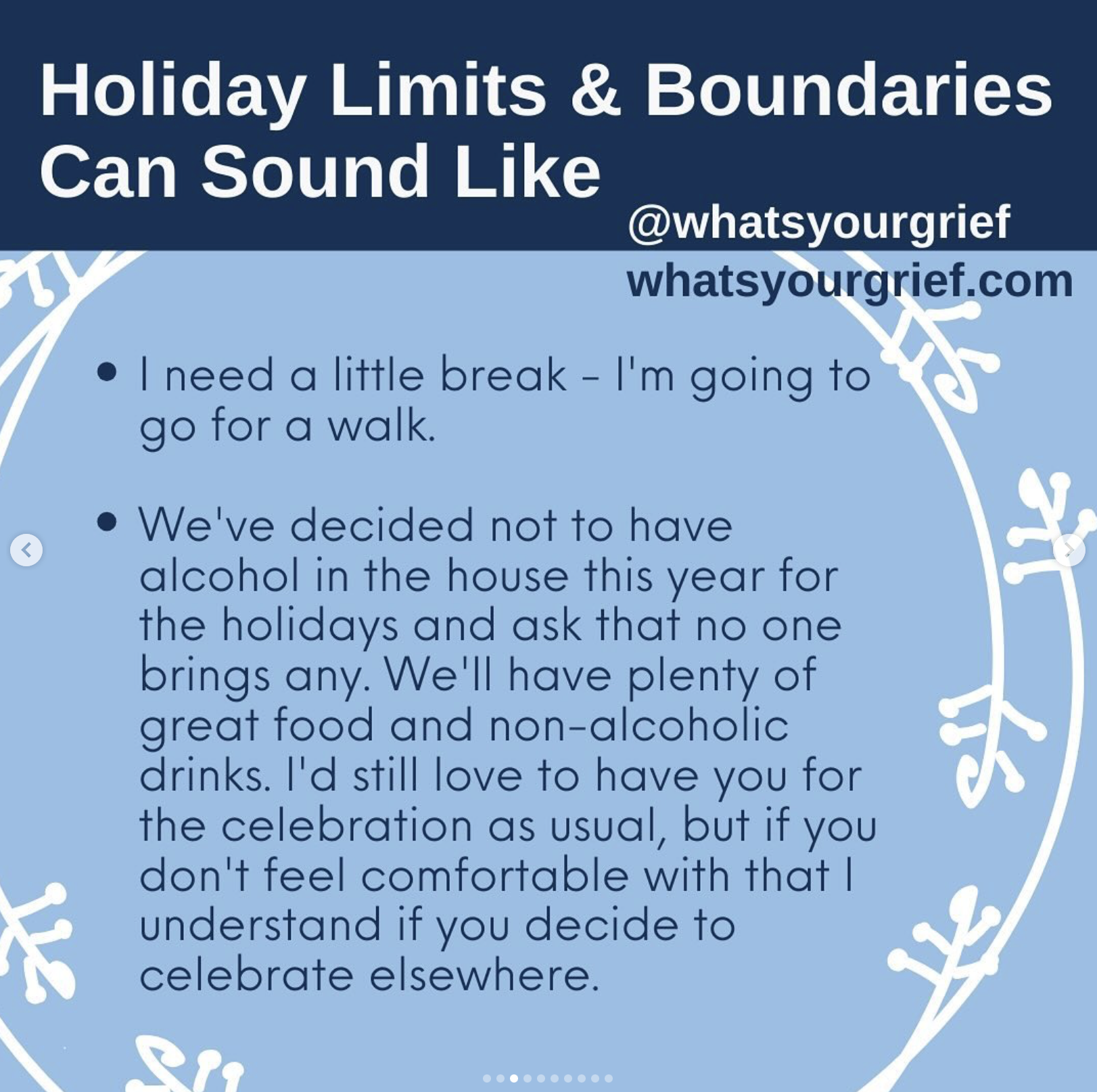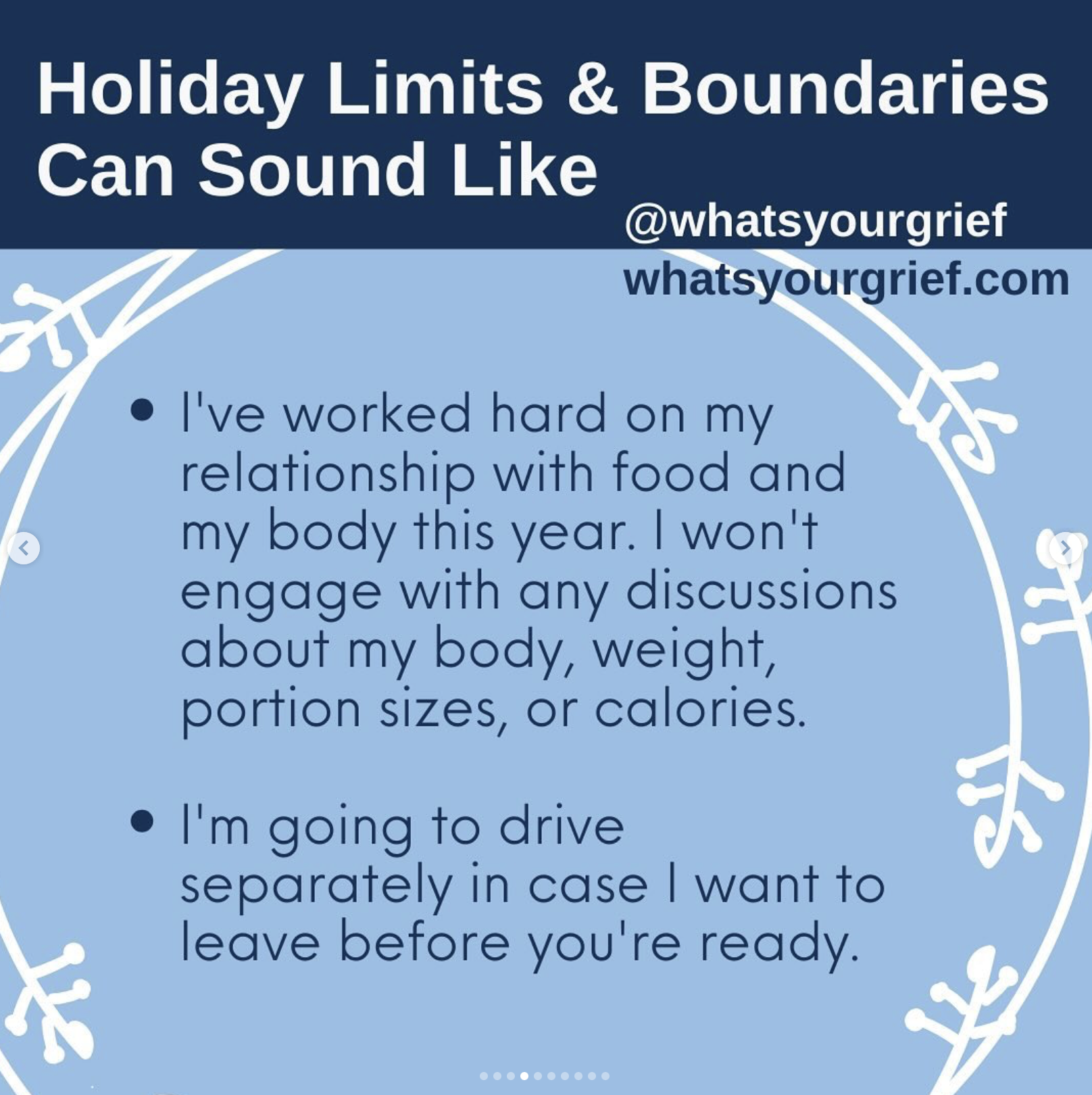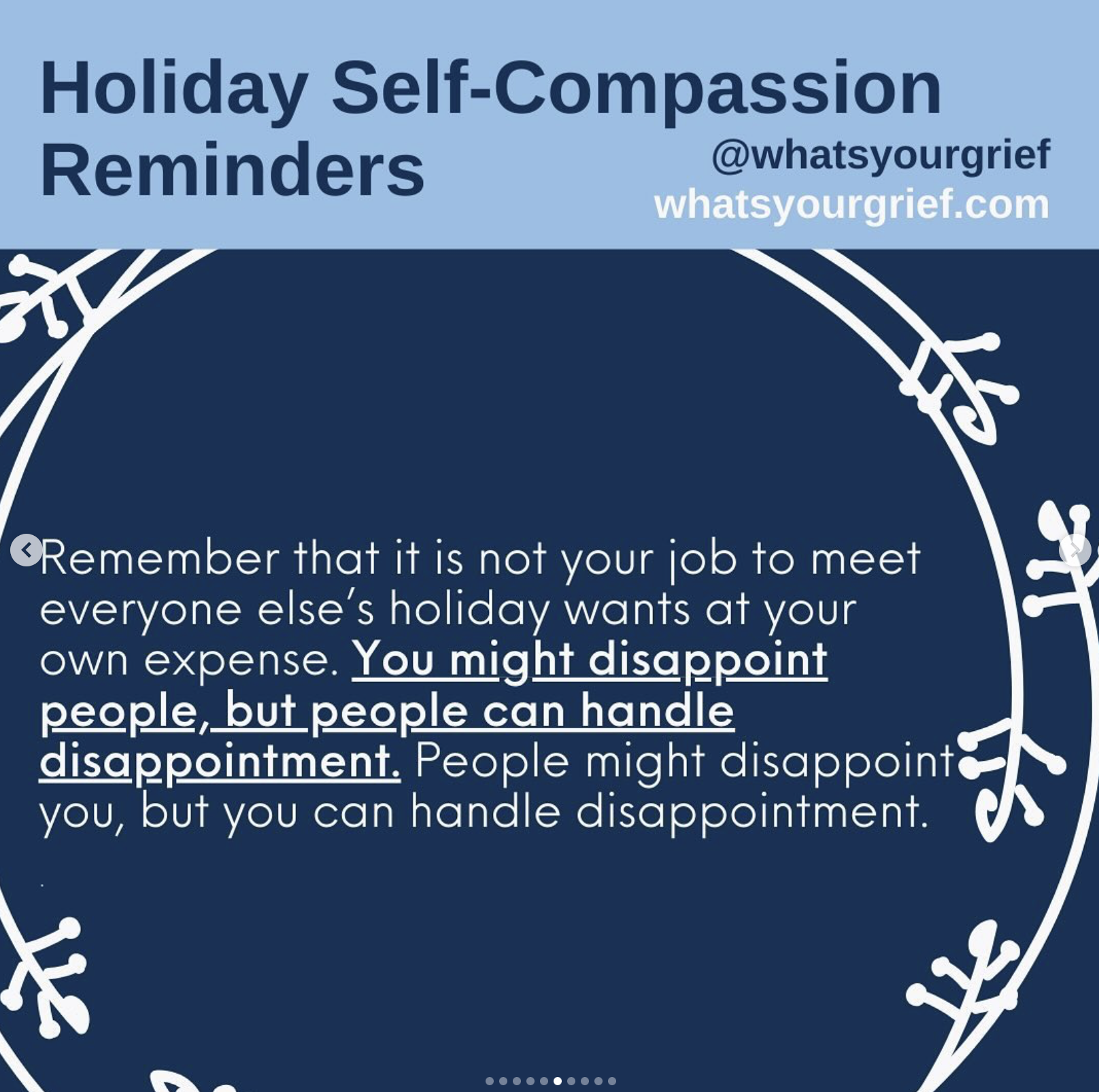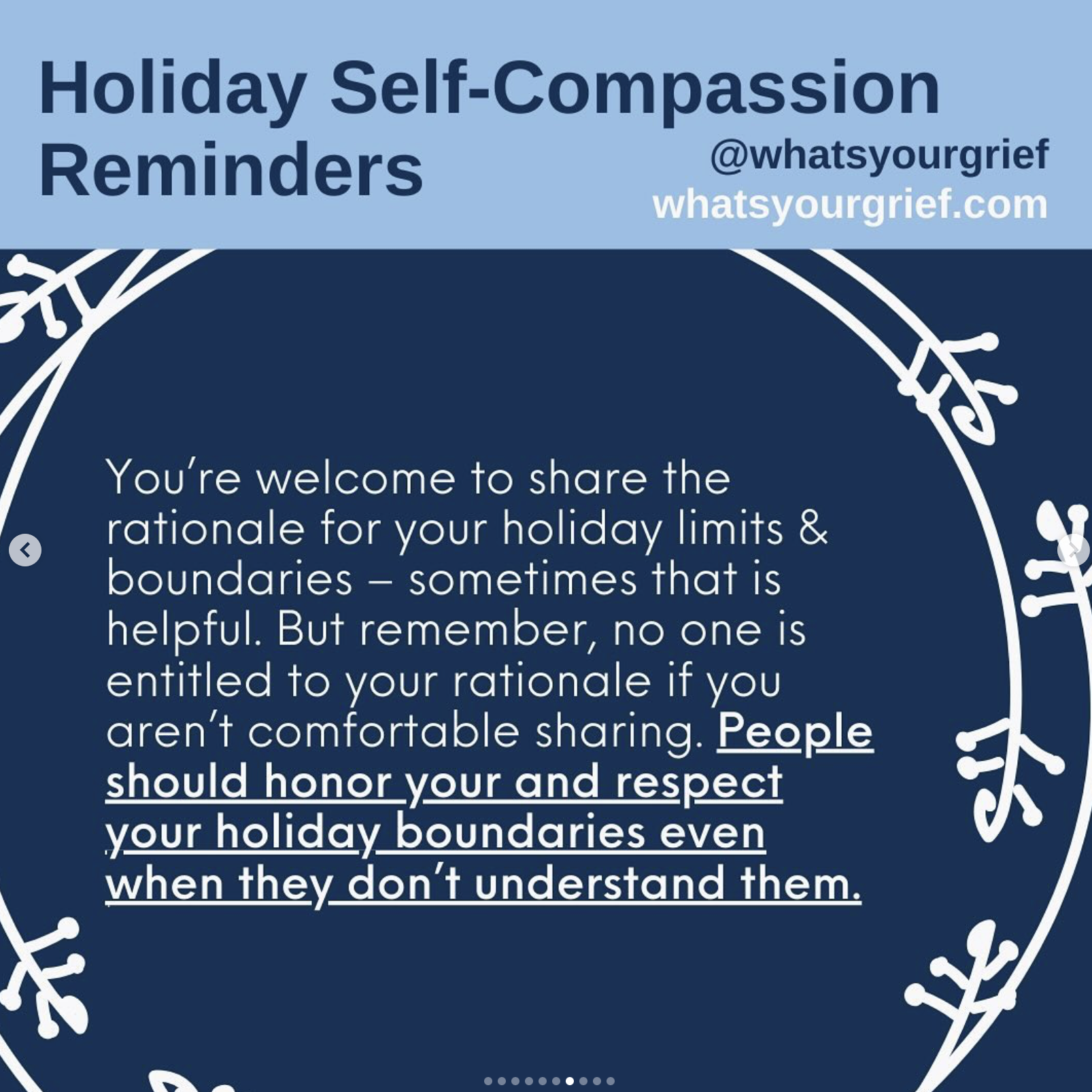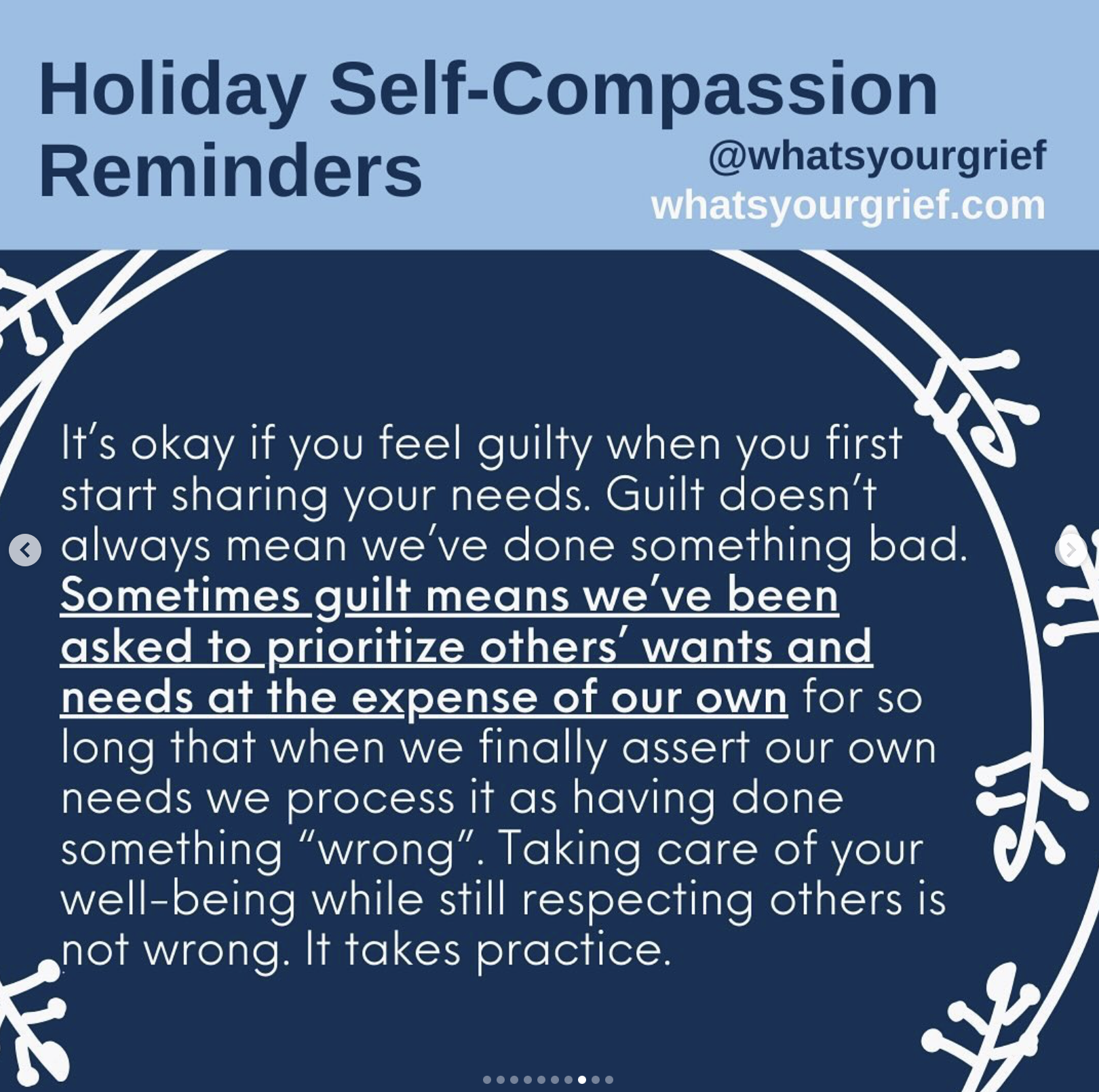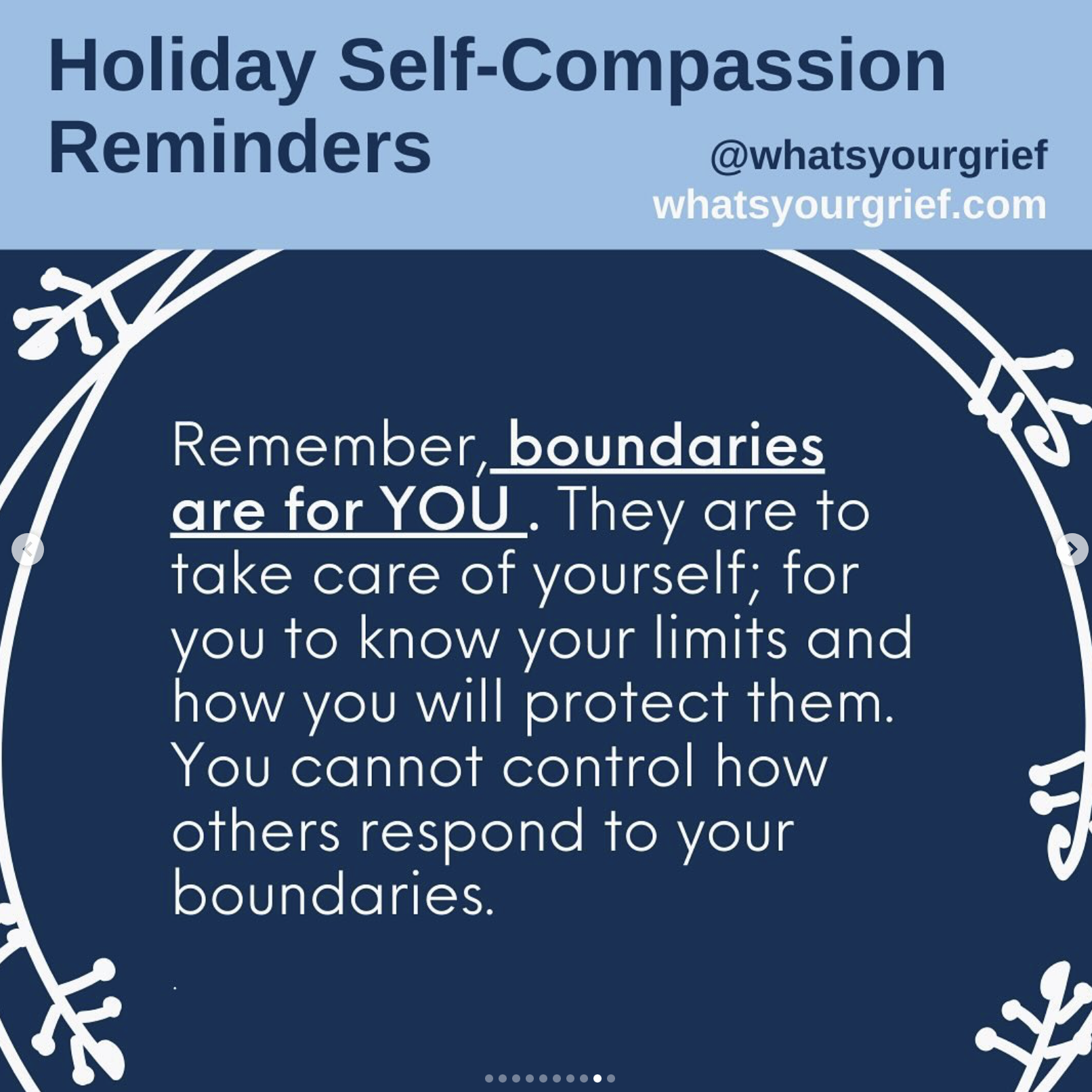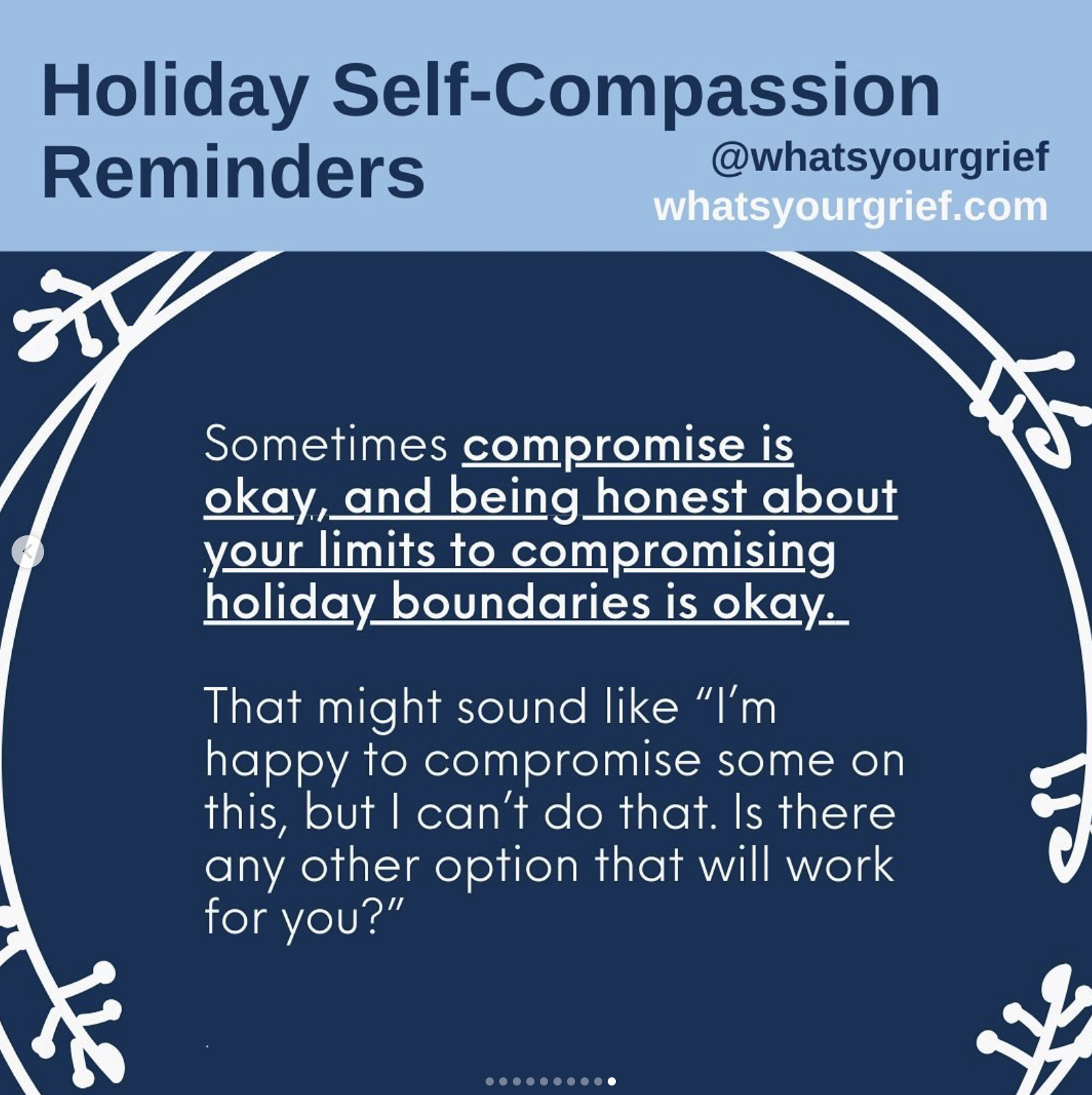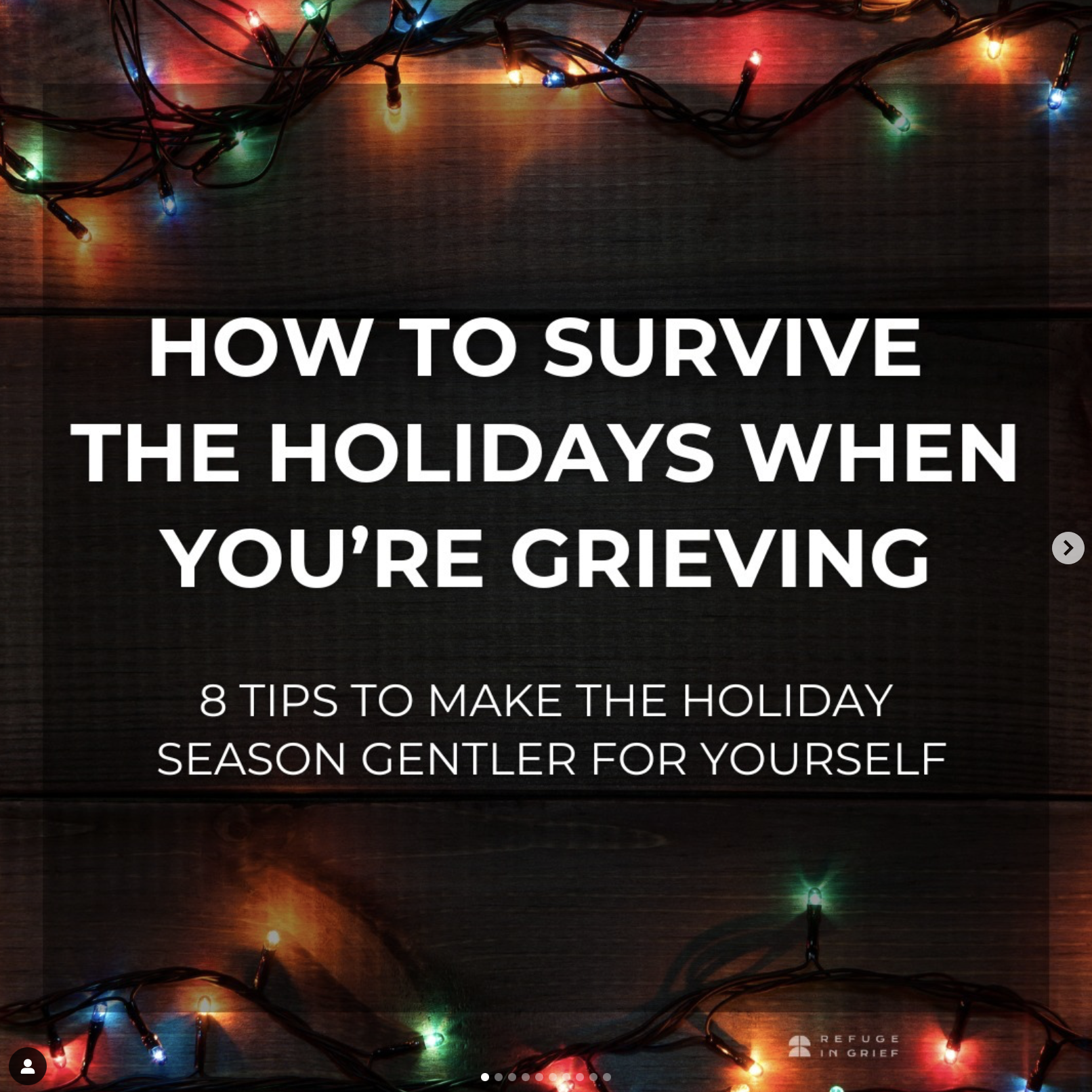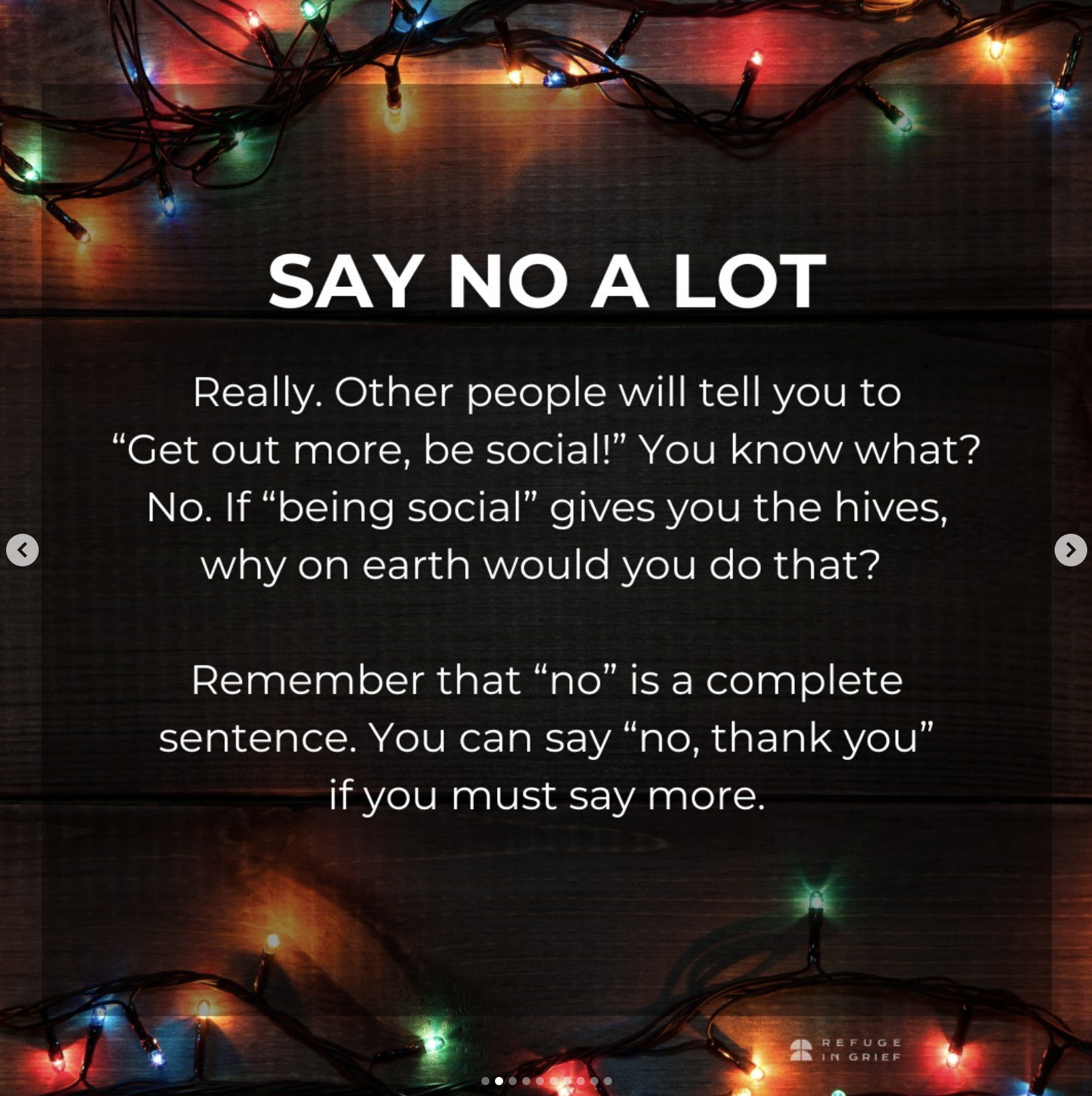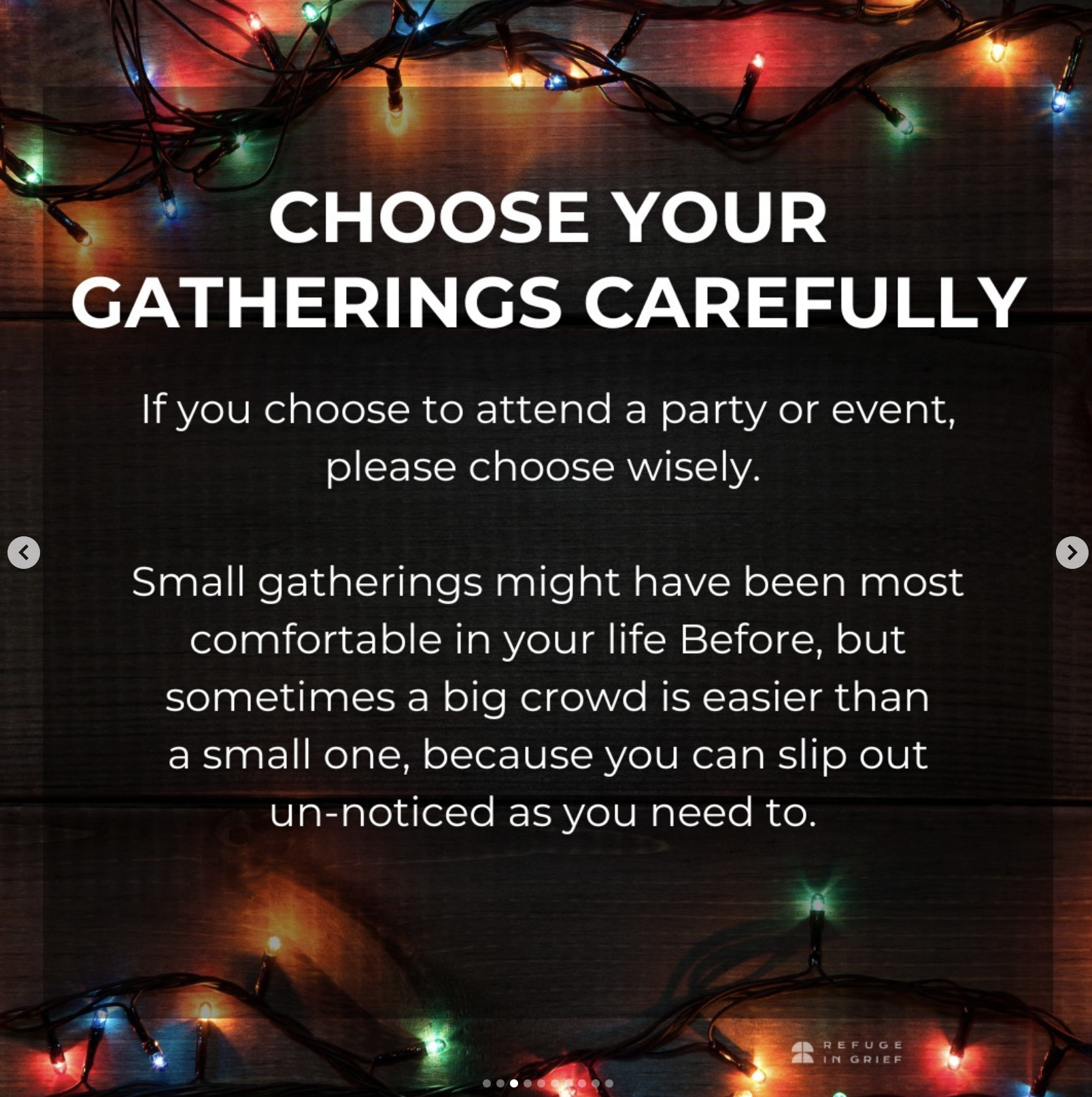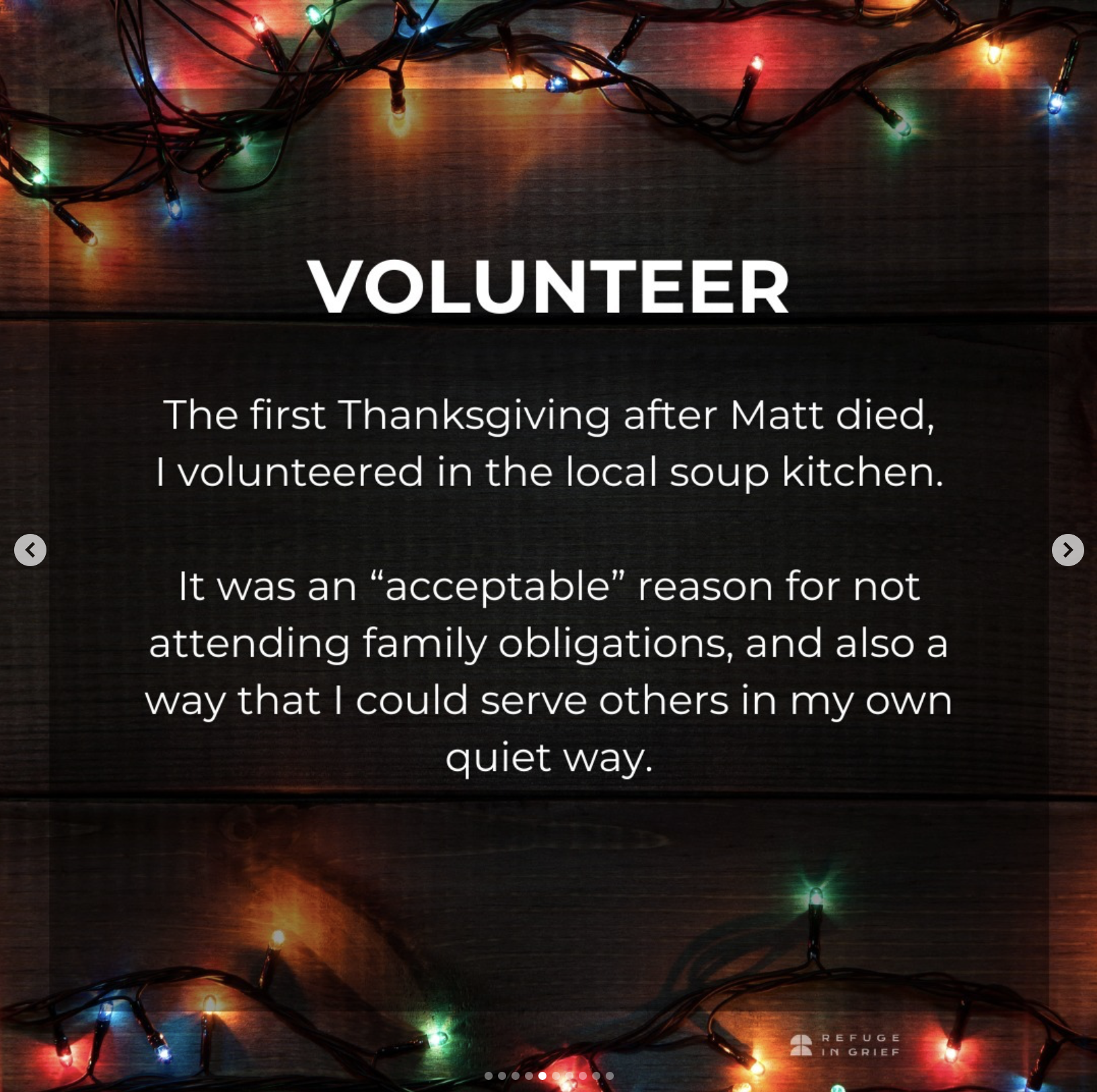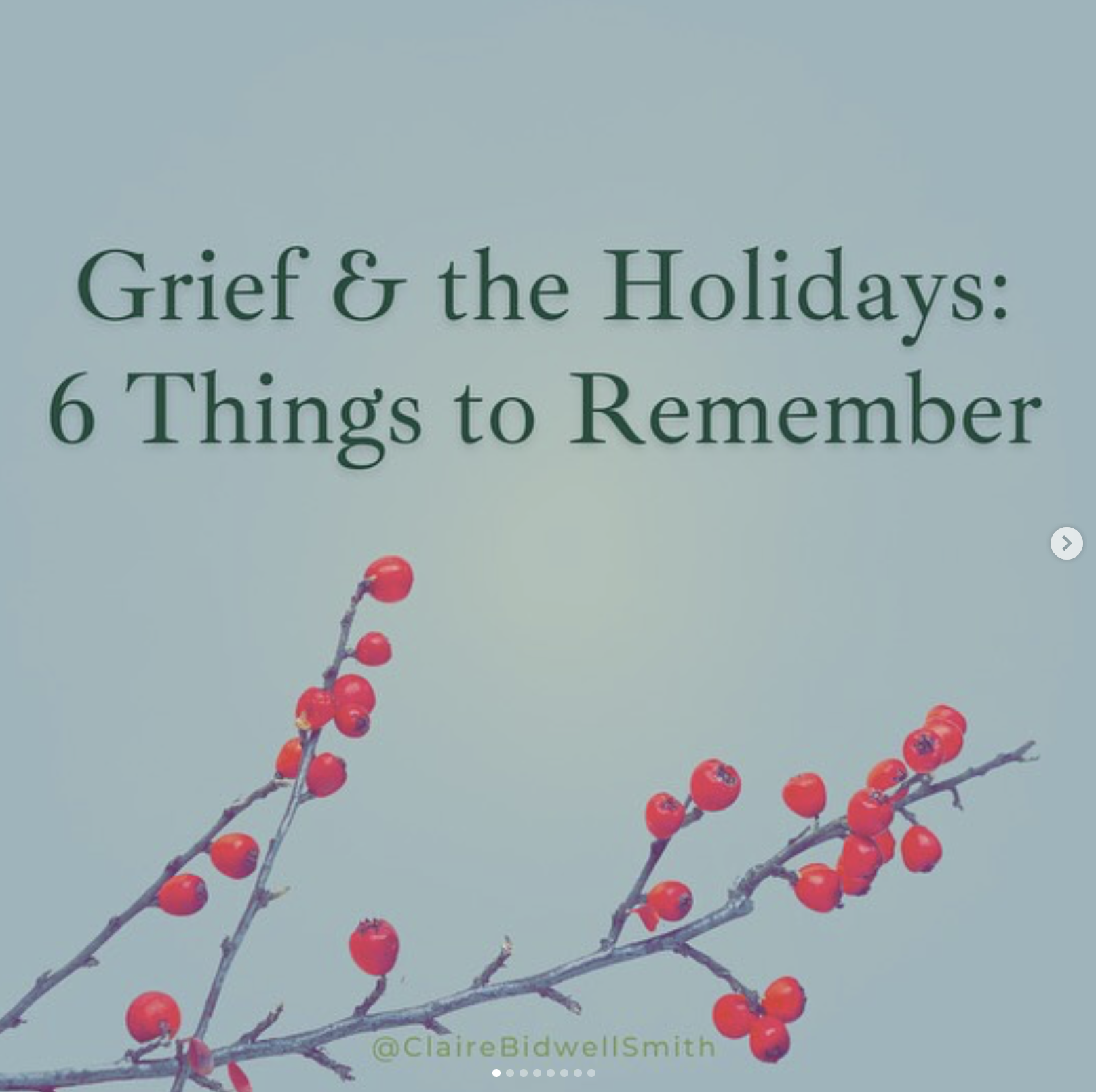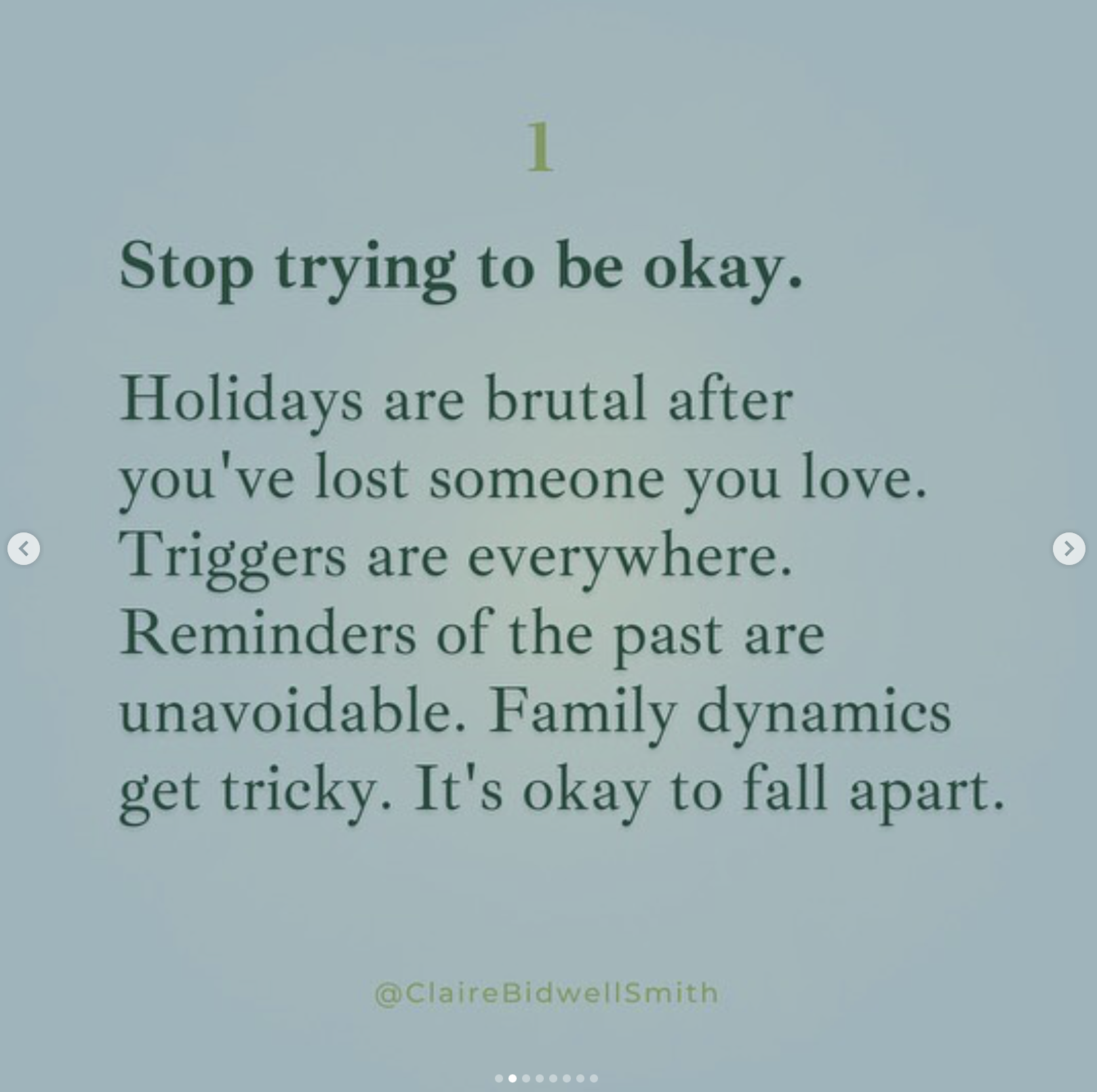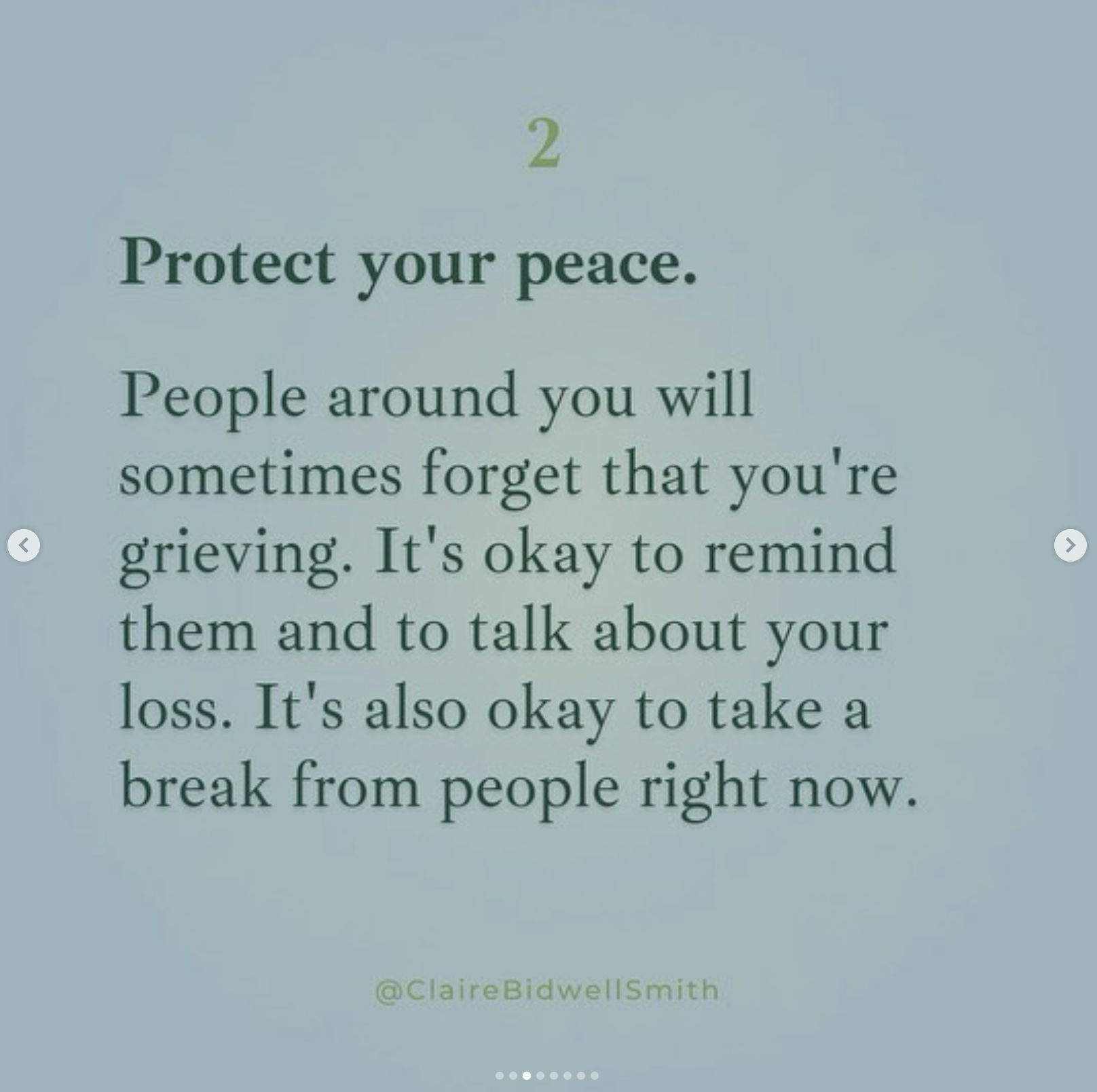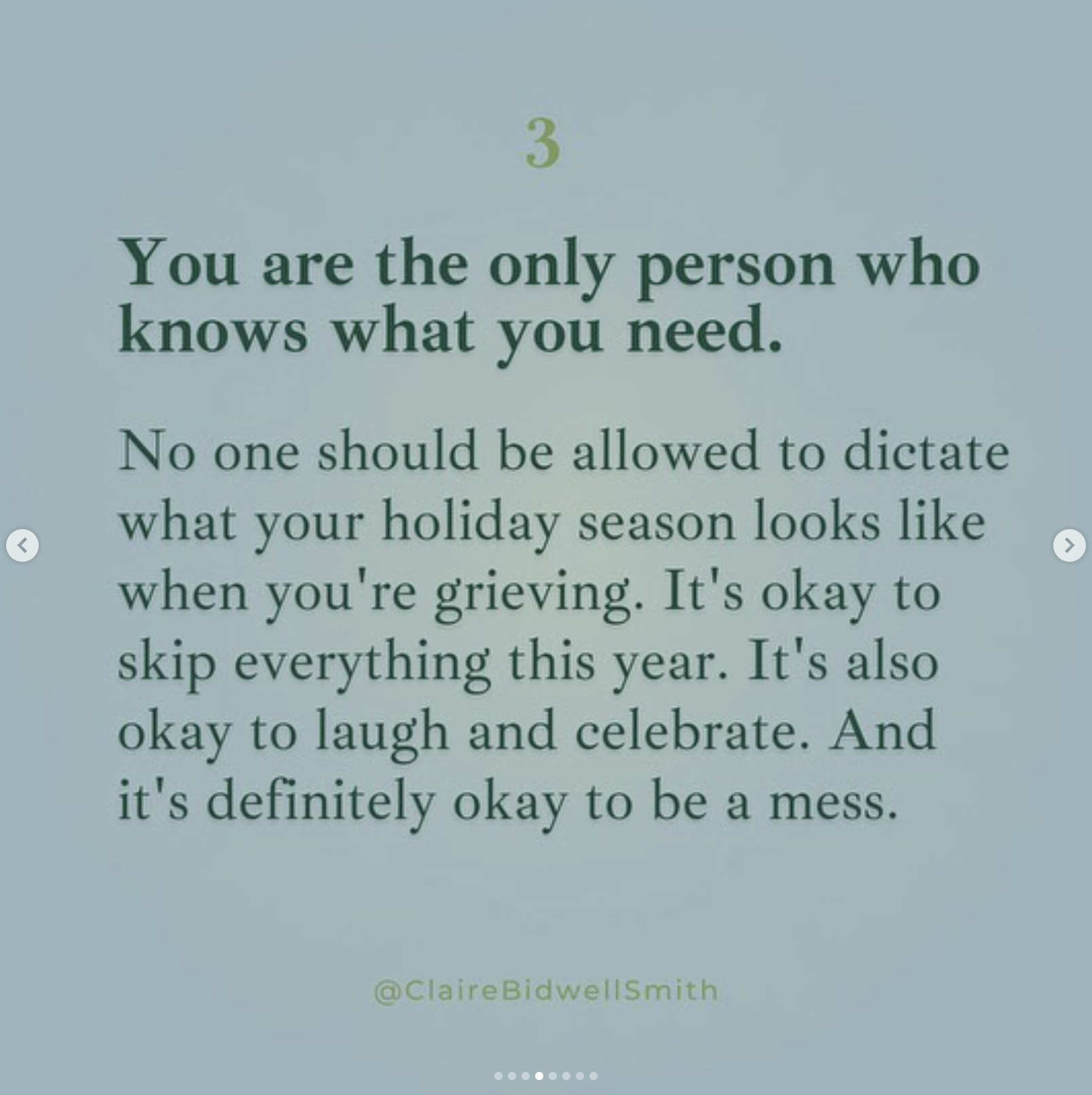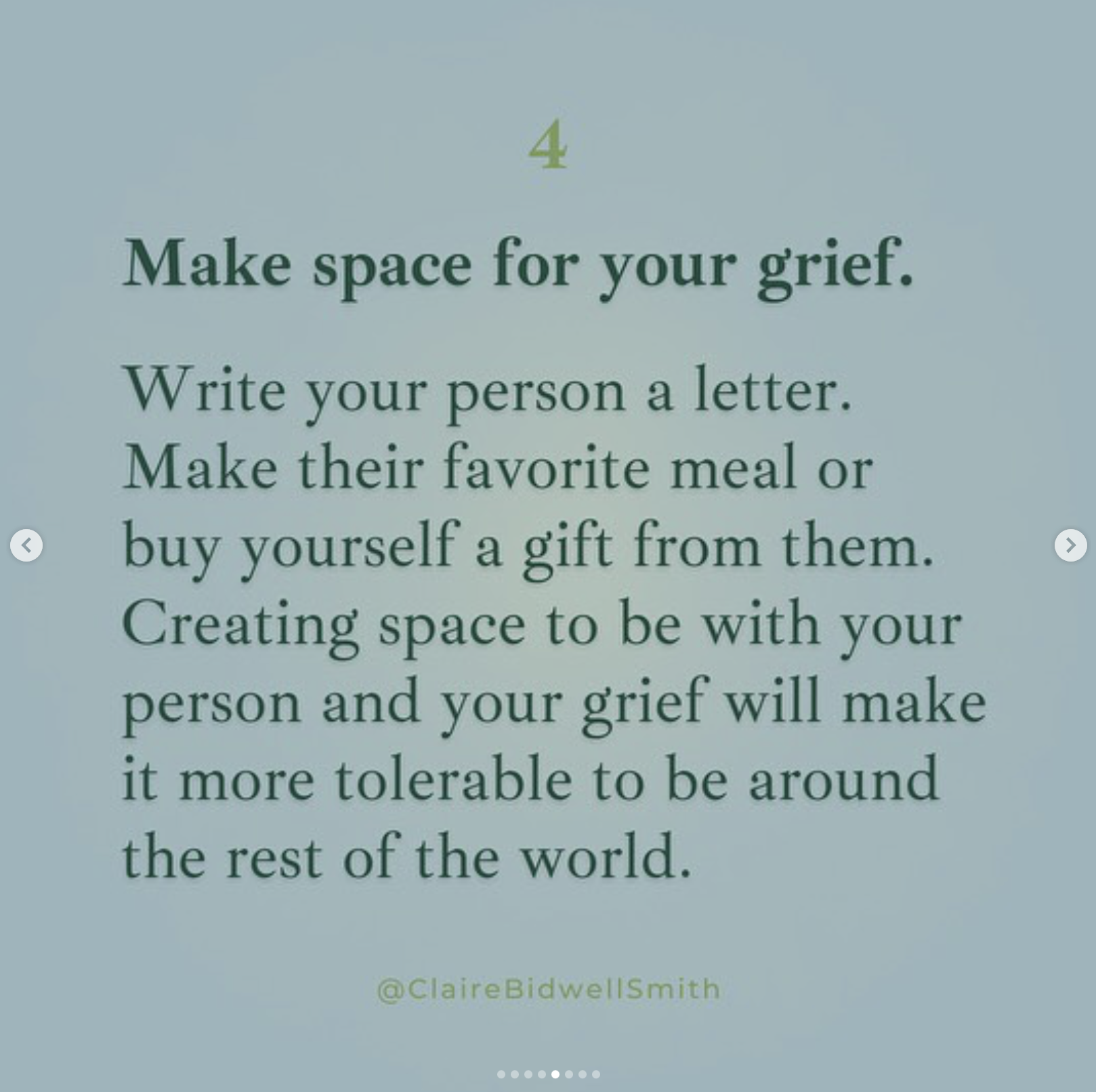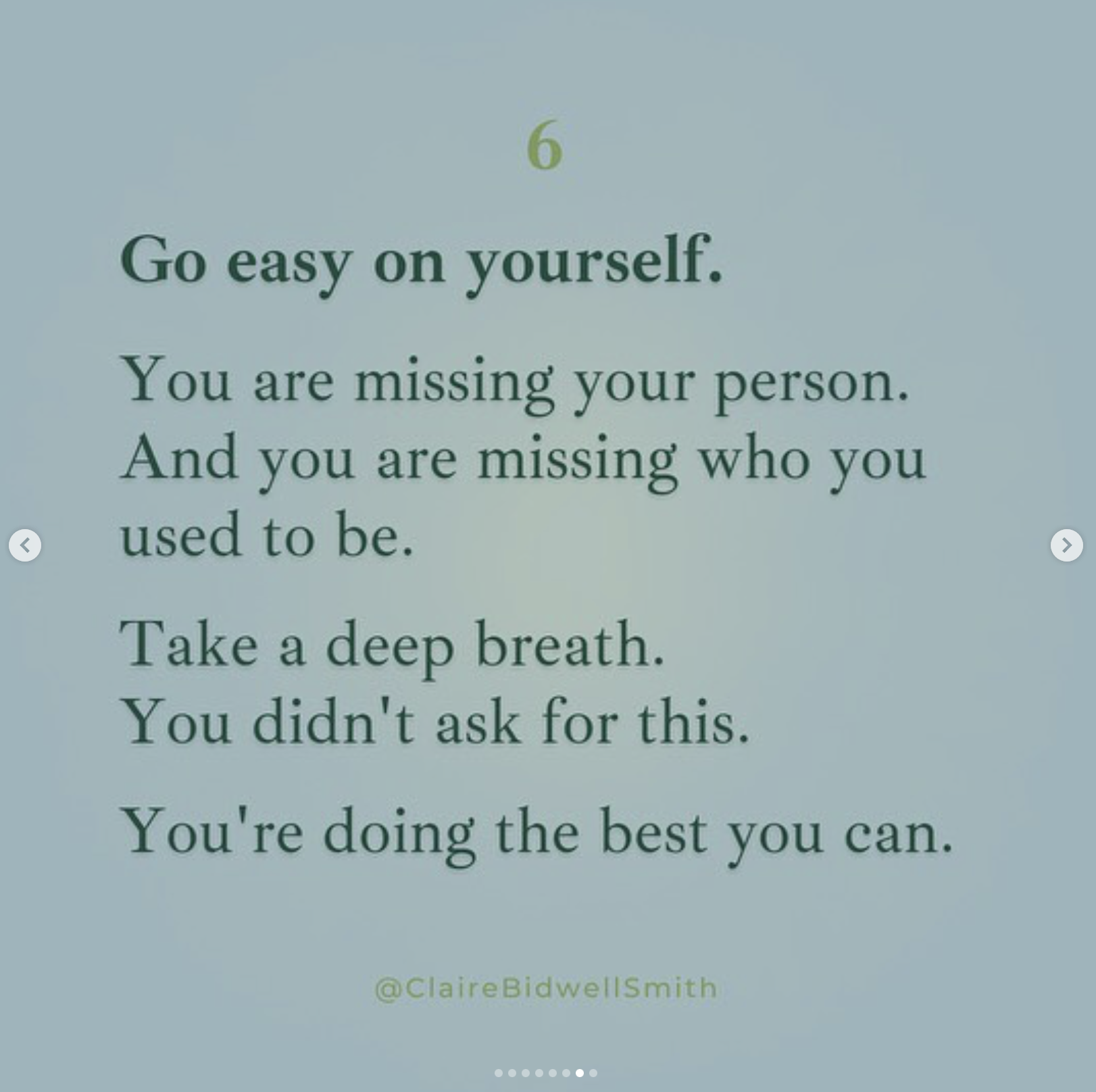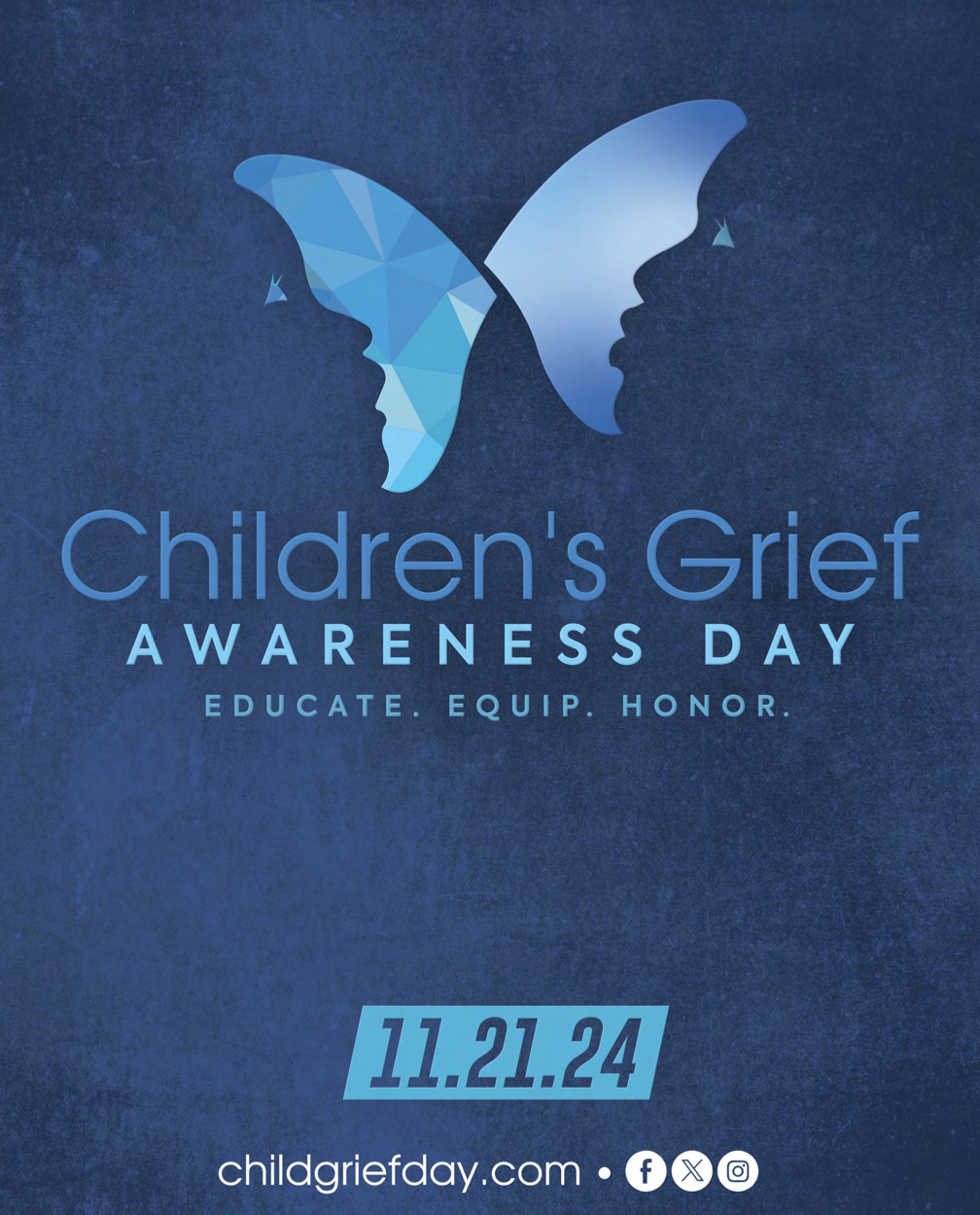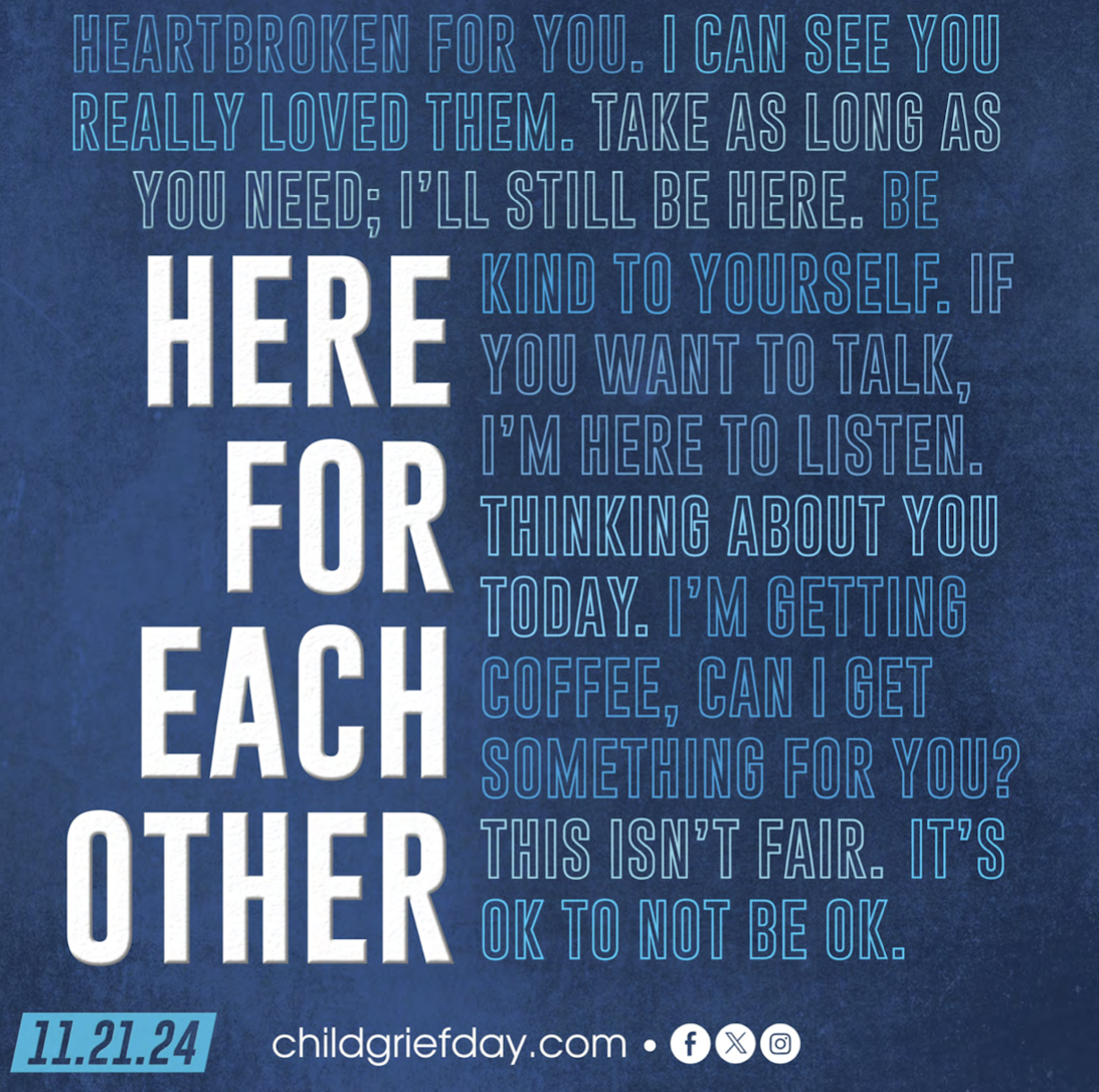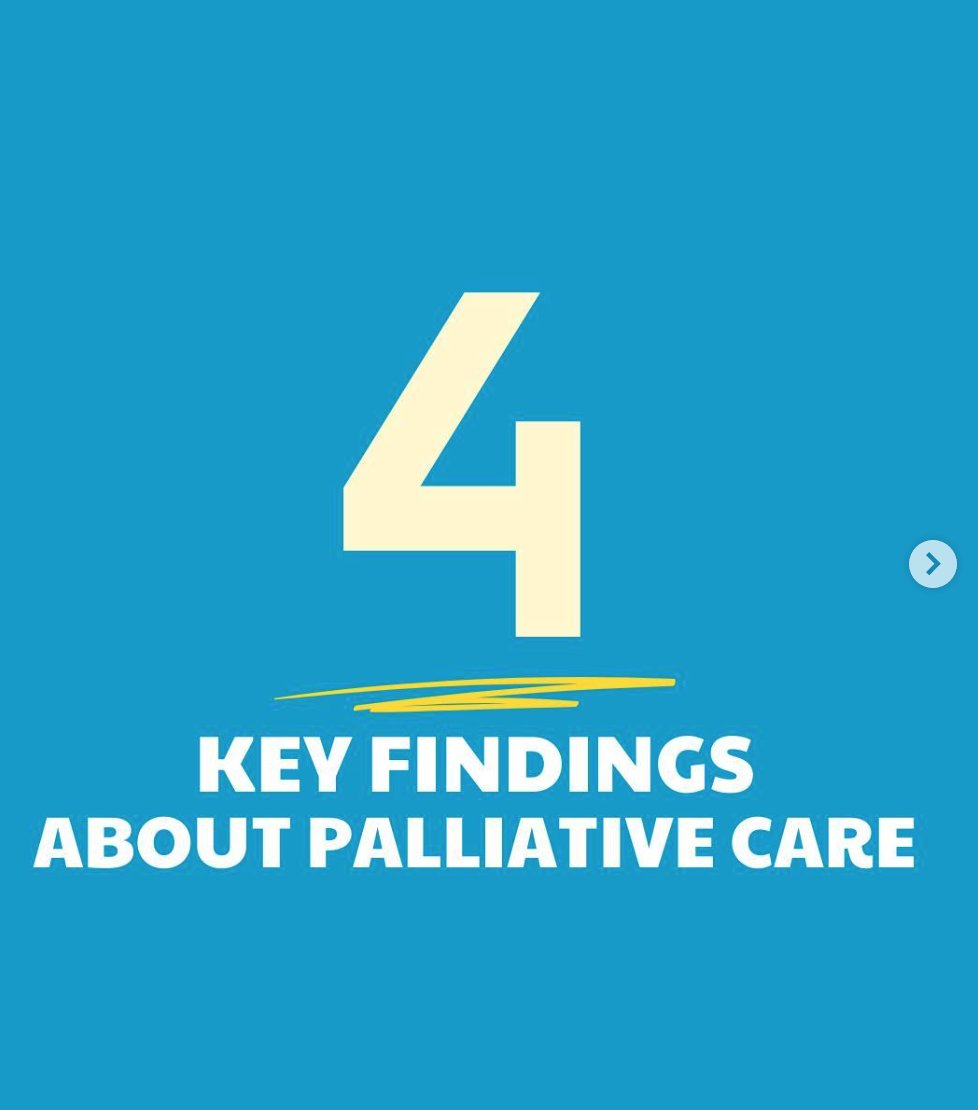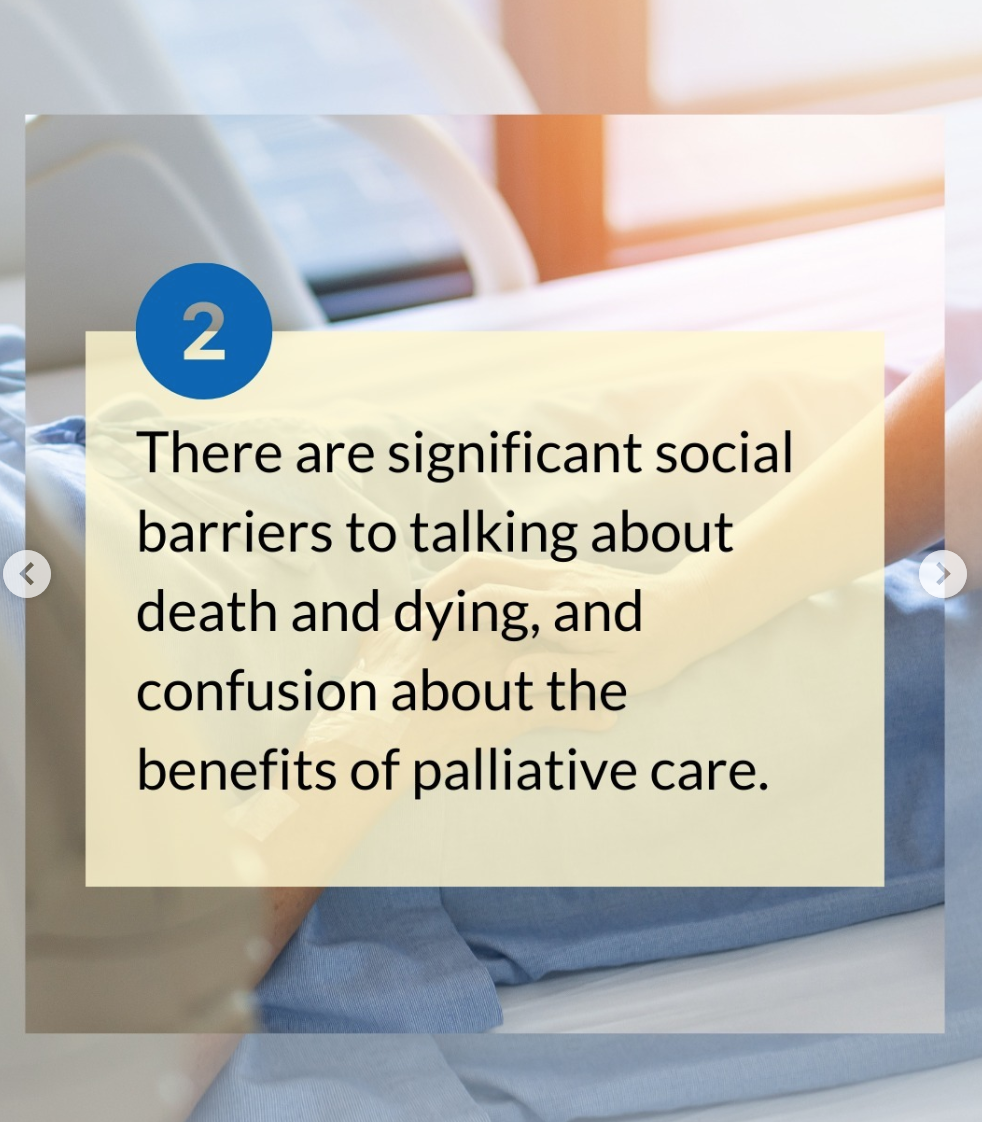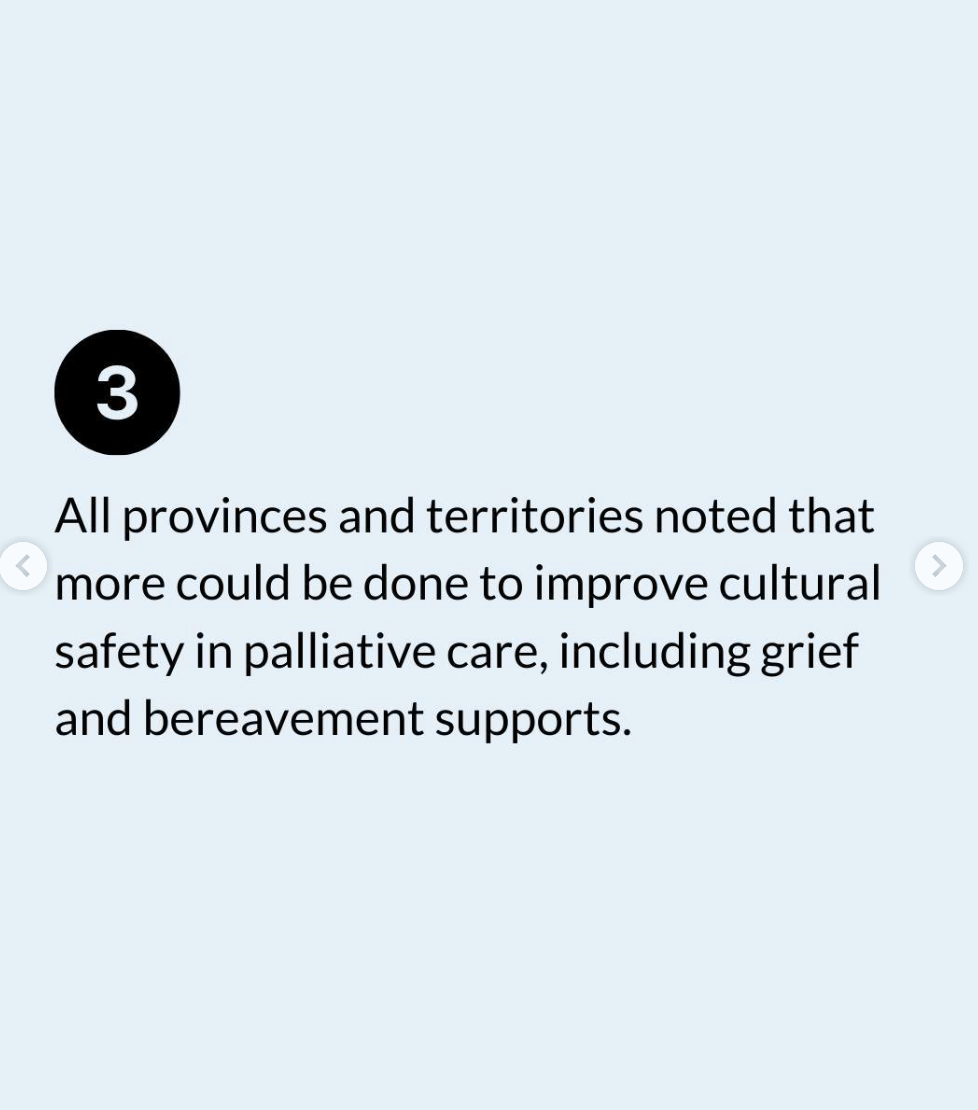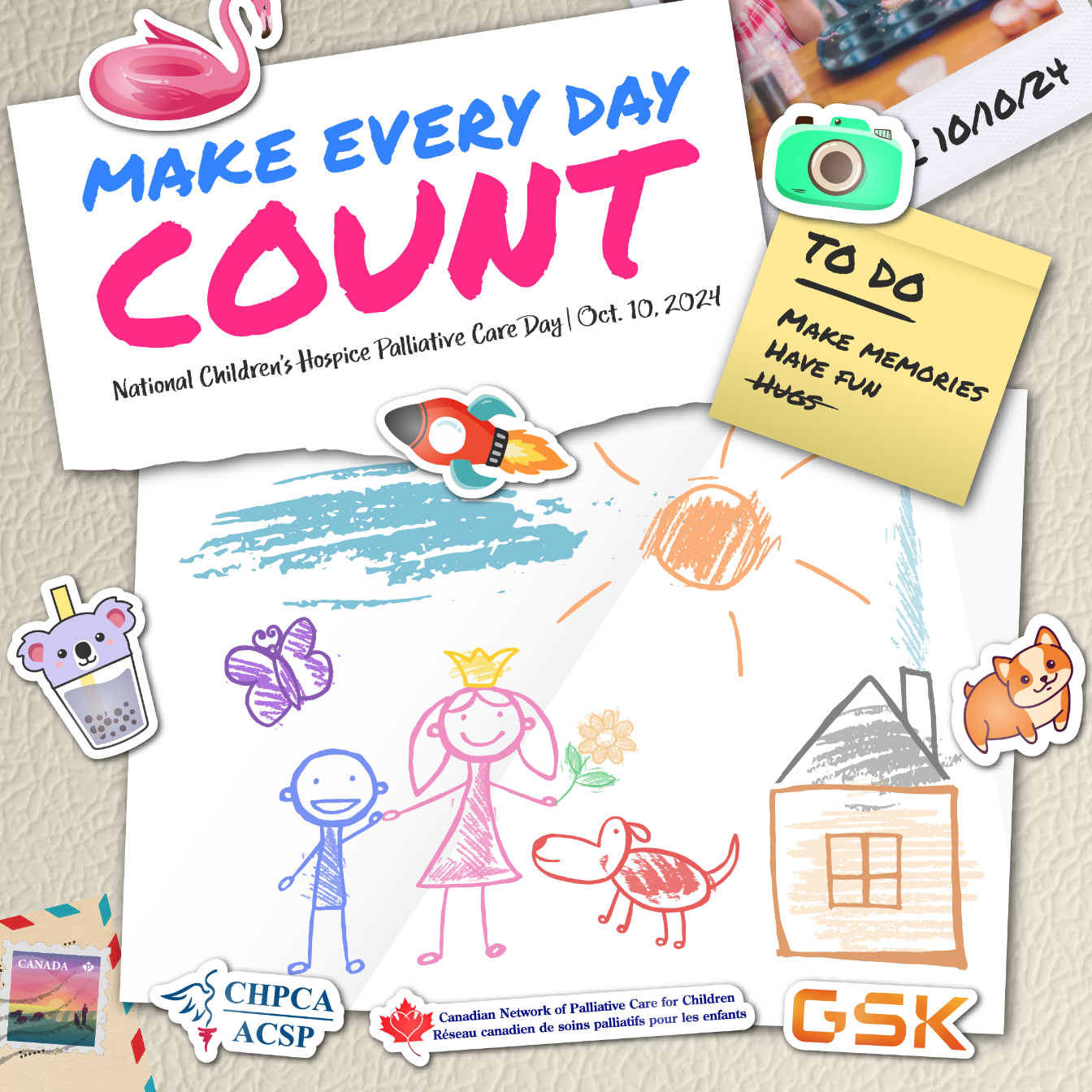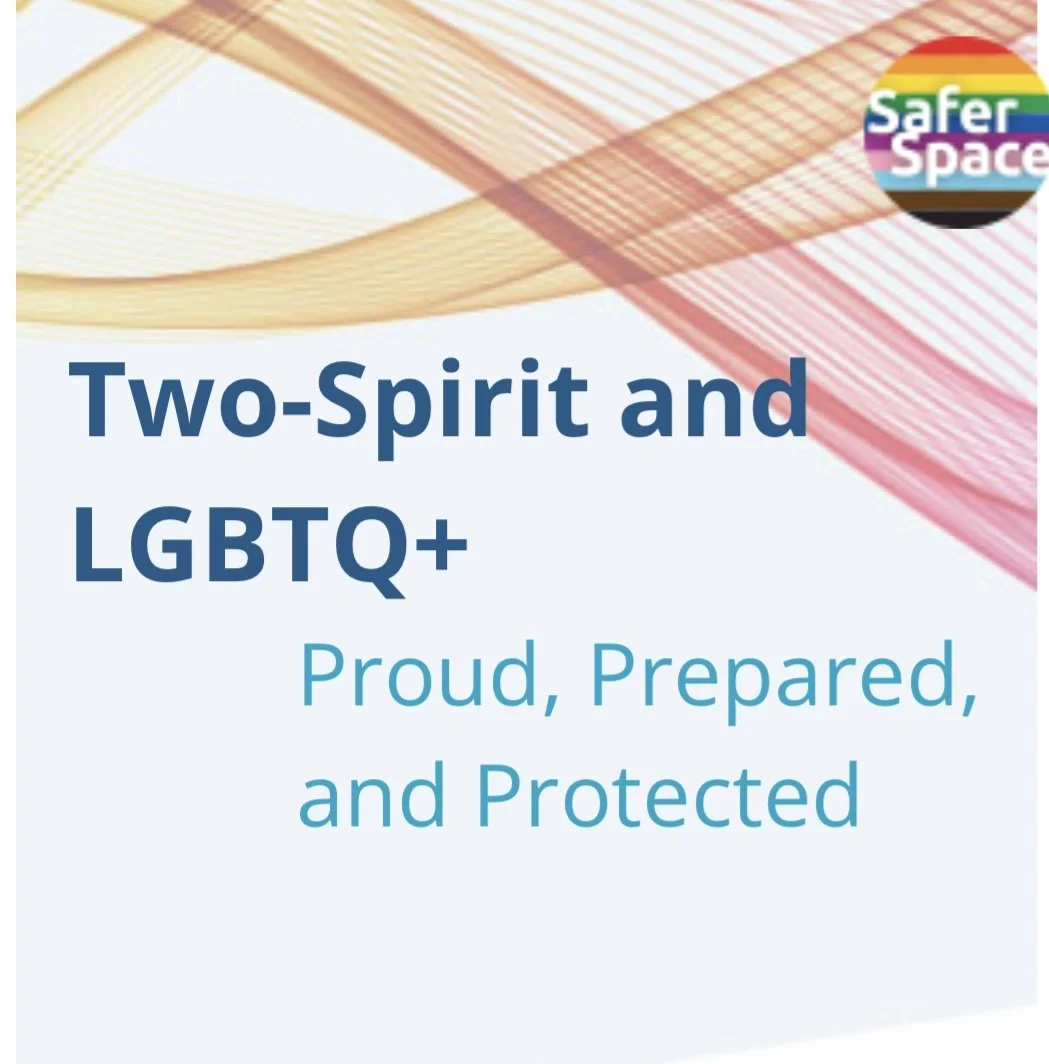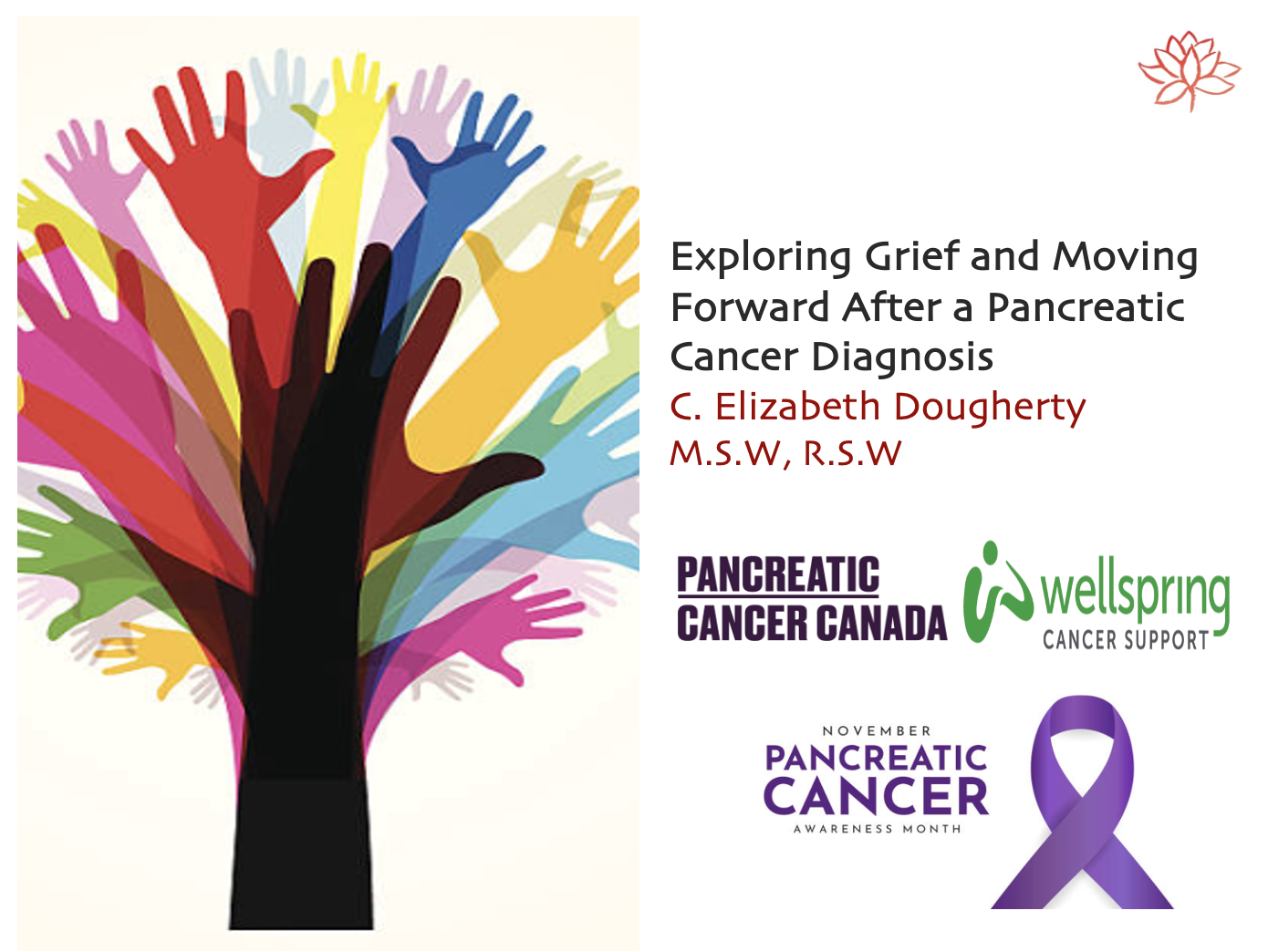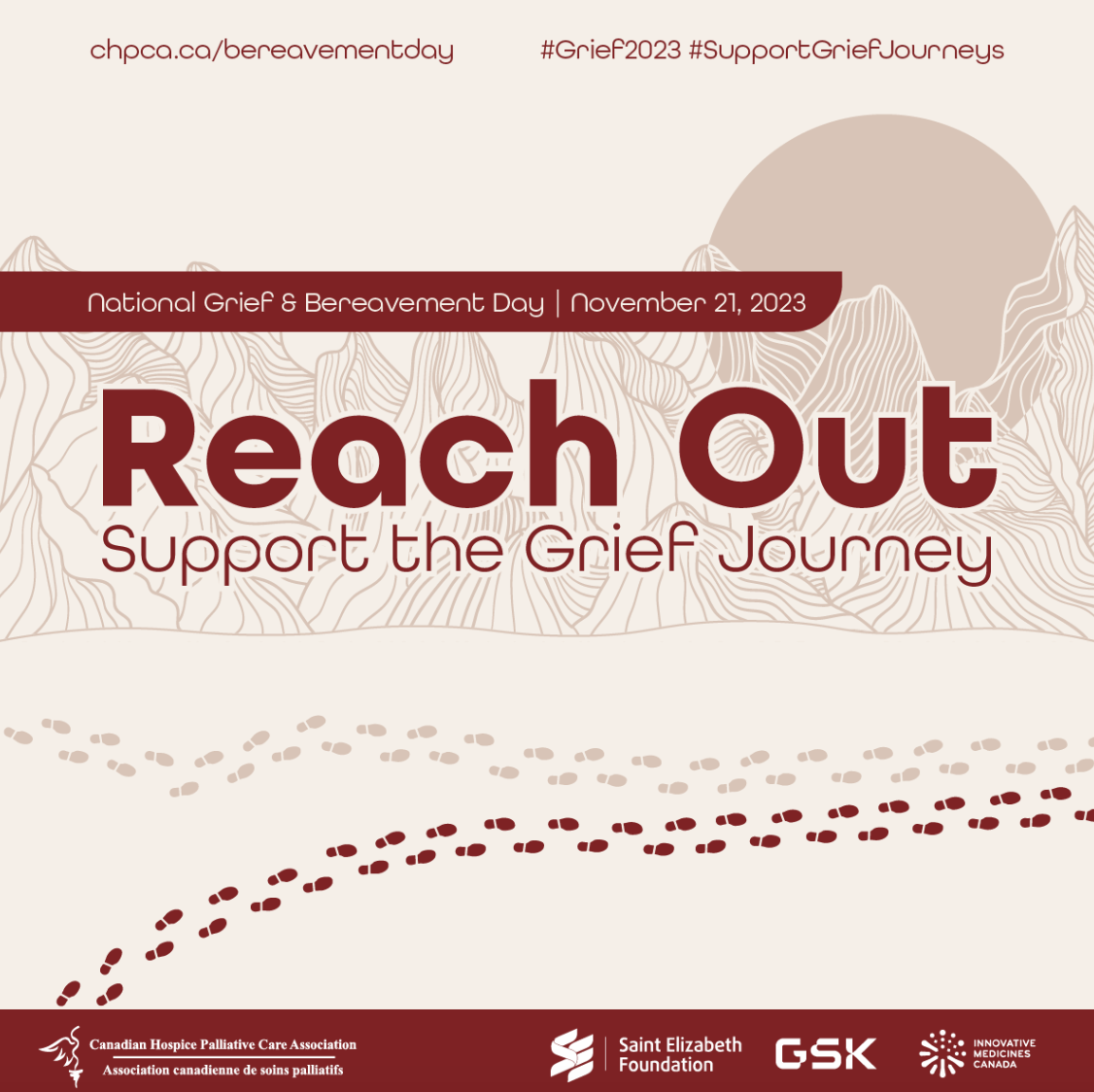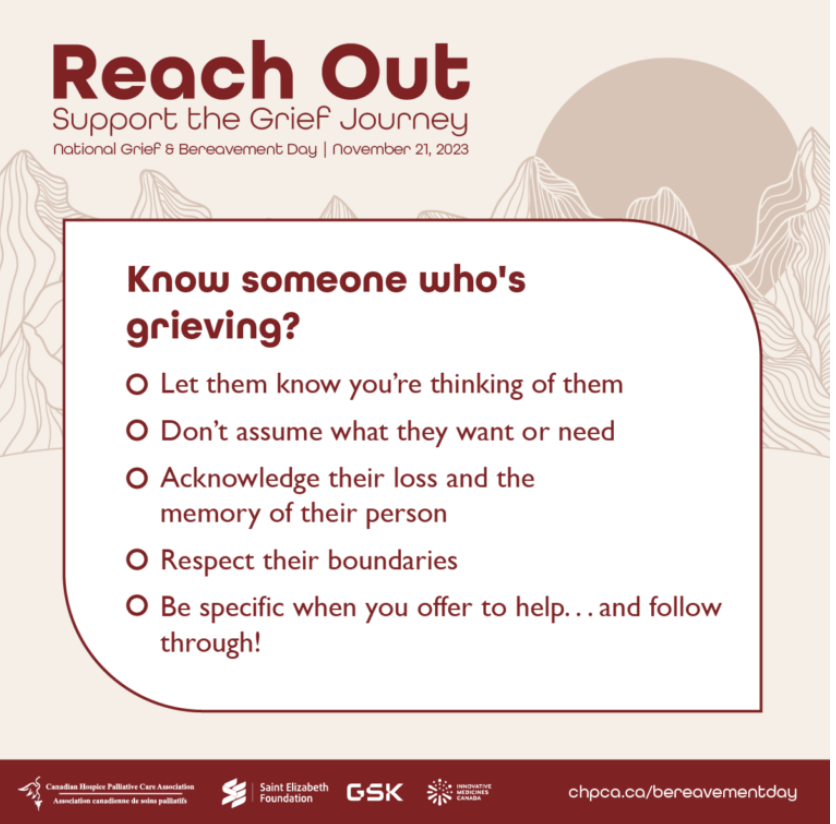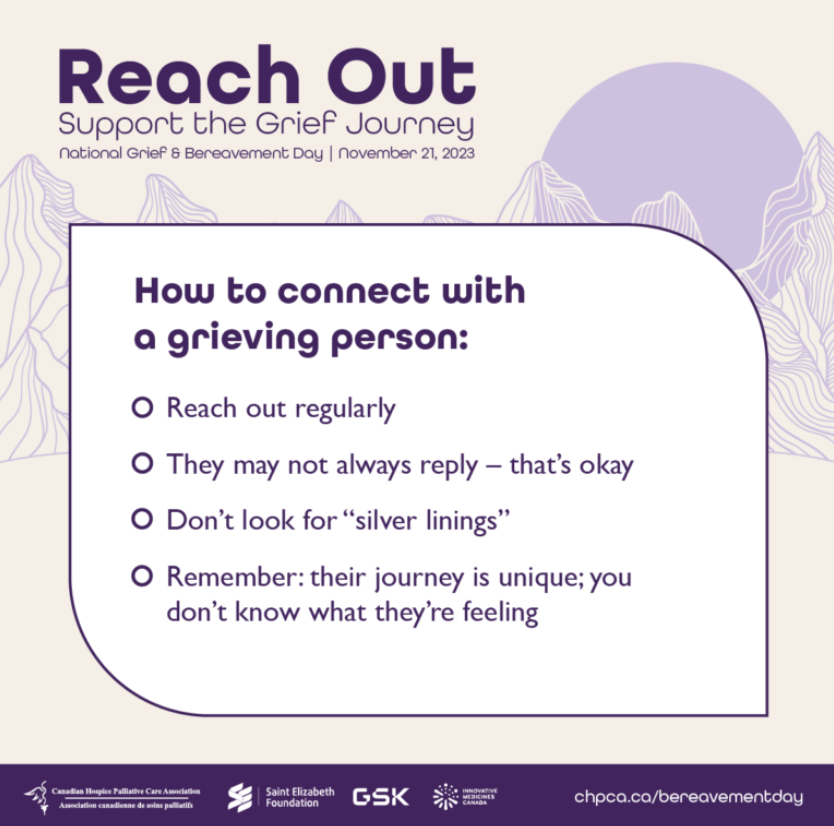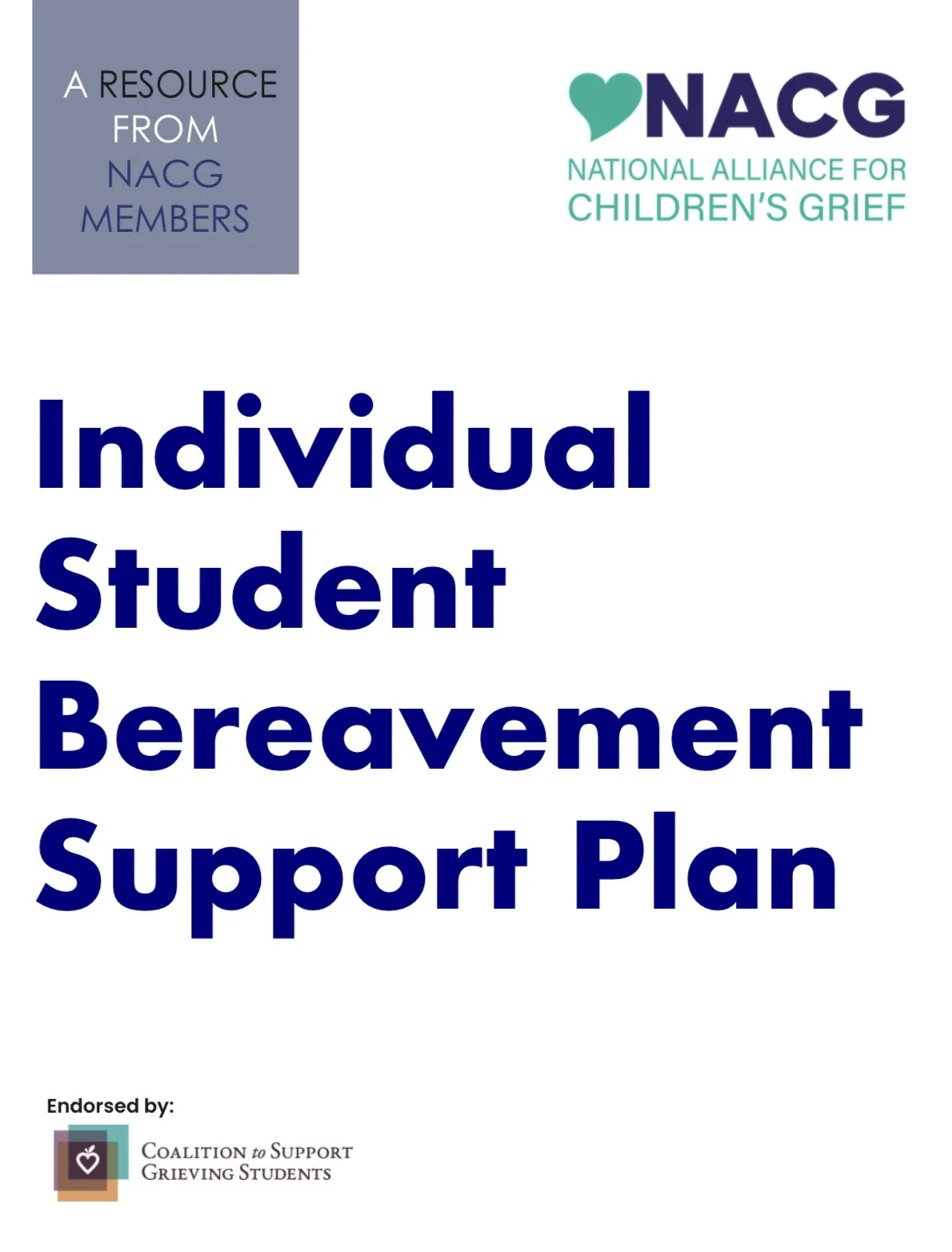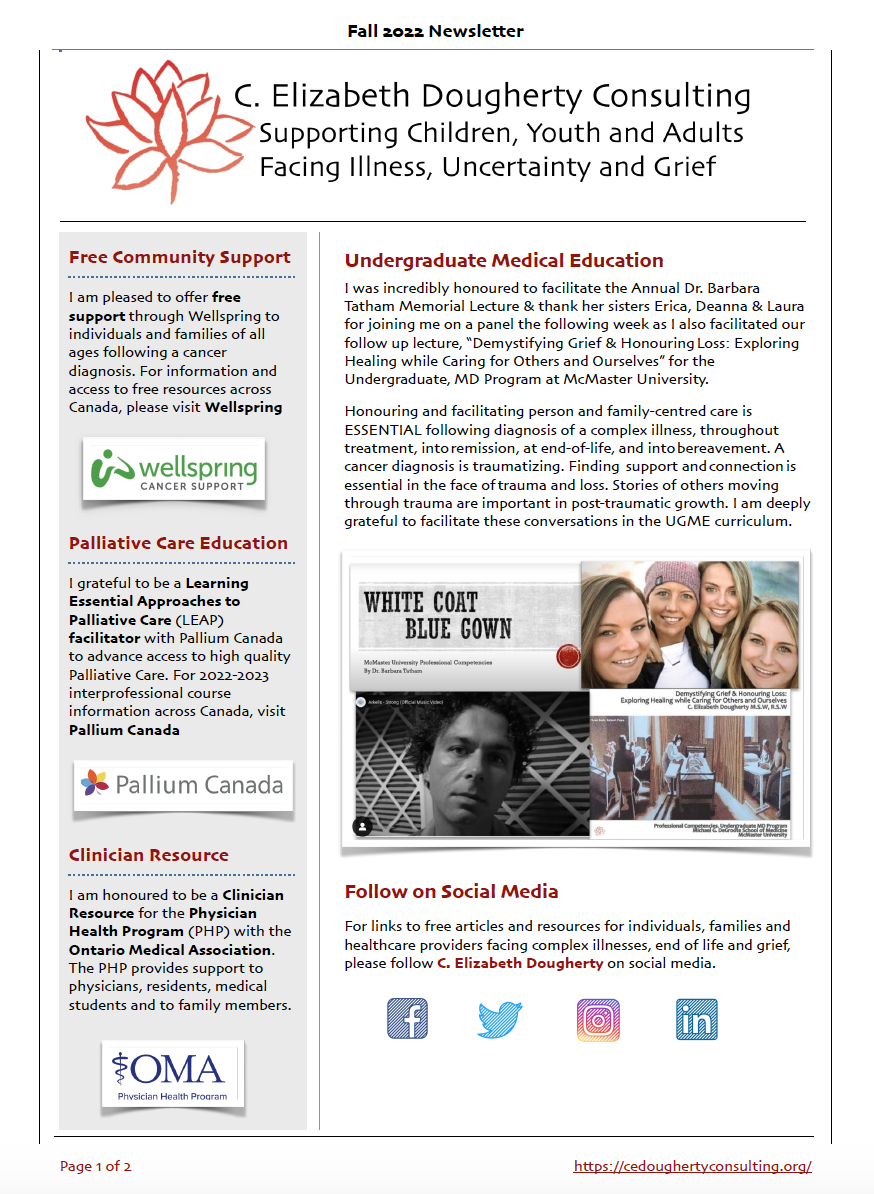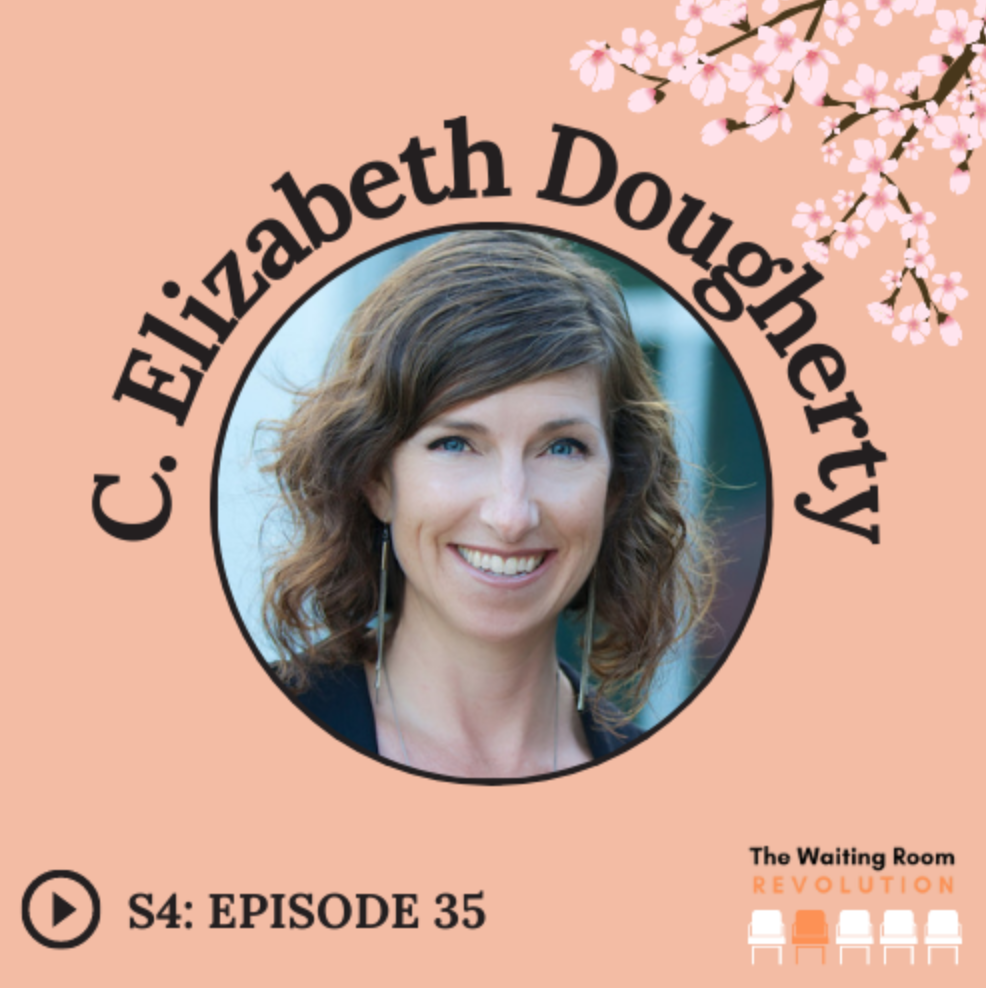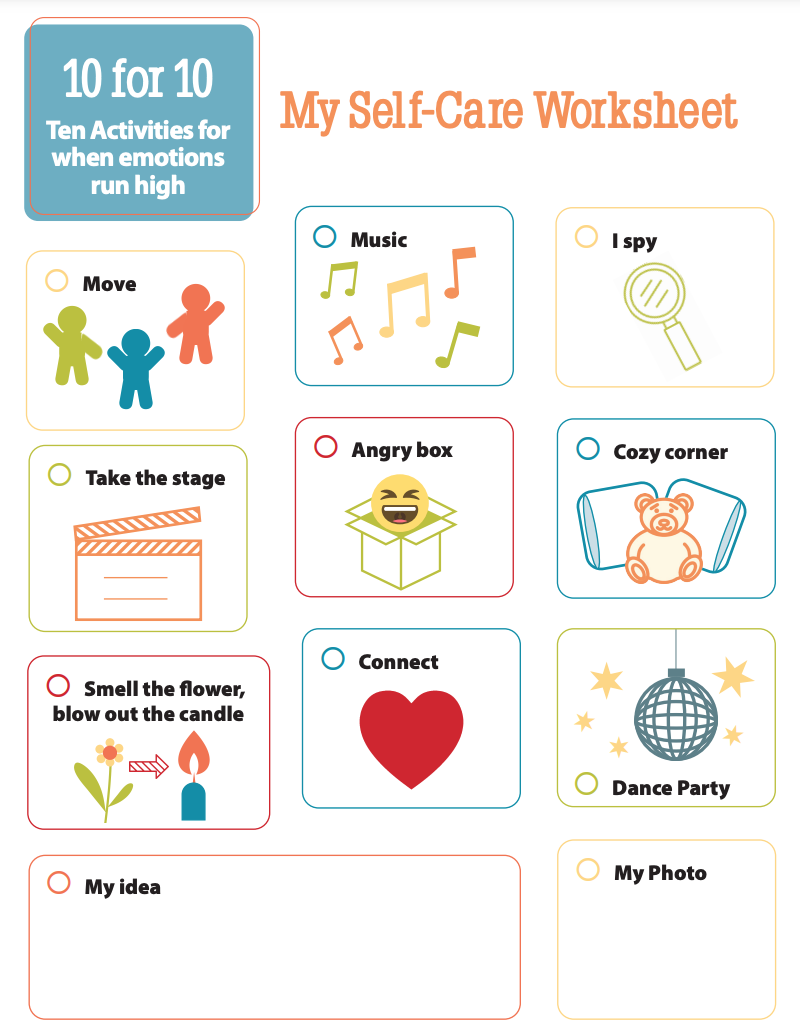Holiday Limits, Boundaries and Self-Compassion Reminders" via What’s Your Grief (WYG). Visit Archive for the Holiday Season via WYG
How to Survive The Holidays When You're Grieving
How to Survive The Holidays When You're Grieving via Megan Devine
"The holiday seasons adds an extra measure of pain to people already bearing more than they can, more than they should ever have to. There is the empty seat at the table, the heaviness of all the ways the one you love is missing, traditions that have gone flat, smacking against the empty place.
Death, illness, massive life events — they all sour the season in ways those outside your loss can’t understand. Given that this season is going to be rough, how will you survive? Here are some of my holiday survival rules from my own early days. Remember, whatever you choose to do (or not do) this holiday season, staying true to yourself is important.
If you have someone who consistently tries to talk you out of your 'no,' you might respond by calling them out on their coercion: 'I keep telling you no, and you keep trying to convince me that I’m wrong. I need you to respect my decision.' Friends and family get to feel disappointed in your no, but they don’t get to force you to say yes.
Whether you are missing someone who should be part of the festivities, or you are missing someone who shared your love of quiet acknowledgment over raucous partying, this season will likely add to your grief.
Companion yourself. Care for yourself. Listen to yourself. Reach out where it feels good to reach, curl in when that is what you need. Make this season as much of a comfort to yourself as you can.
May your holiday season (or non-holiday, depending) be as safe, and full of love and connection as it can be.”
Visit refugeingrief.com for more Grief Support.
Grief & the Holidays: 6 Things to Remember
In the midst of the focus on joy & cheerful celebrations at this time of year, sharing a reminder of "Grief & the Holidays: 6 Things to Remember" via Claire Bidwell Smith
Children's Grief Awareness Day is observed on the third Thursday in November
Children's Grief Awareness Day is observed on the third Thursday in November. This time of year is a particularly appropriate time to support grieving children and youth as the holiday season is often an especially difficult time after a death.
Children's Grief Awareness Day brings attention to the fact that support can make all the difference in the life of a grieving child or teen. It provides an opportunity to raise awareness of the painful impact that the death of a loved one, with an opportunity to make sure that grieving children and teens receive support they need.
Children and youth who have experienced the death of someone important to them often feel isolated, like their struggles are invisible to those around them. Grieving children and teens need advocates and allies navigating supportive ways to move forward. Every school and community has children and teens who have experienced loss. Children’s Grief Awareness Day is about recognizing that no young person should have to navigate grief alone.
We raise awareness so that people will understand that a grieving child or teen can't just "get over it”, not in any set time period, not by any act of their own will - and that there's no reason they should just "get over it. We can ensure children and youth feel seen, heard, and understood with the right tools, compassion and support.
Source: Children's Grief Awareness Day
World Hospice and Palliative Care Day is Saturday October 12th
Palliative Care is often misunderstood.
10 Myths About Palliative Care infographic dispels common misconceptions about palliative care.
This resource is available in English and 13 other languages, including:
-French
-Arabic
-Brazilian Portuguese
-Catalan
-Chinese
-Cree
-Hebrew
-Inuinnaqtun
-Japanese
-Portuguese
-Spanish
-Tagalog
-Kinyarwanda
Download and share the infographic in your preferred language via:
https://www.virtualhospice.ca/en_US/Main+Site+Navigation/Home/Support/Resources/Books_+Links_+and+More/
Source: Canadian Virtual Hospice
World Hospice and Palliative Care Day is Saturday October 12th.
“We believe that it takes a society to create better treatments, better care, and better support for people living in Canada. Part of making further advancements is offering recommendations to federal and provincial governments that can make supports for people with cancer more accessible, like palliative care.” Source: CCS
The Canadian Cancer Society’s (CCS) report analyzing palliative care across Canada will direct advocacy and support initiatives in the coming years. This report highlights 4 key findings about palliative care:
1. Canada still lacks the capacity to consistently deliver palliative care in communities, particularly in hospice.
2. There are significant social barriers to talking about death and dying, and confusion about the benefits of palliative care.
3. All provinces and territories noted that more could be done to improve cultural safety in palliative care, including grief and bereavement supports.
4. Access to palliative care would be enhanced with additional training of healthcare professionals in more healthcare settings.
To ensure that palliative care reaches those who require it, there needs to be a shift in the awareness and understanding of services for everyone, including providers, caregivers, and patients. There also needs to be an increased understanding of the landscape of palliative care services across Canada. The palliative care needs of a population cannot be met by palliative care specialists alone.
Source: 4 key findings about palliative care. CCS
To read more, visit: https://cancer.ca/en/about-us/stories/2024/4-key-findings-about-palliative-care
World Hospice and Palliative Care Day is Saturday October 12th.
This is an annual unified day of action to celebrate and support hospice and palliative care around the world and the theme this year is: Ten Years Since the Resolution: How are we doing? The year 2024 marks 10 years since the World Health Assembly (WHO’s Governing Body) passed the only stand-alone resolution on palliative care, calling for all countries to “strengthen palliative care as a component of comprehensive care throughout the life course.”
Palliative care is recognised as a fundamental component of health care systems, including Universal Health Coverage and primary health care. Yet, sadly, approximately 86% of people around the world who need palliative care cannot access it. Some 18 million people die every year with pain and suffering, due to lack of access. Much of the problem of lack of care is caused by a lack of awareness of how palliative care should be given, and why it is important.
On this World Hospice and Palliative Care Day, we call upon governments, policymakers and providers to prioritise and implement national strategies for bereaved populations based on a public health approach. It is estimated that for each death, up to 9 people are directly affected by the loss. Given that about 120 million people died over the past two years (including over 6 million from COVID), Then over a billion people are experiencing bereavement by one or more deaths of people significant to them in the past two years.
If you would like any further information, please visit the World Hospice and Palliative Care Day website for more information about events at http://www.thewhpca.org/world-hospice-and-palliative-care-day.
Source: The THE WORLDWIDE HOSPICE PALLIATIVE CARE ALLIANCE
National Children’s Hospice Palliative Care Day is Thursday October 10th.
"National Children’s Hospice Palliative Care Day raises awareness about the importance of children’s hospice palliative care and how it improves the quality of living and dying for children with serious illnesses and their families. The campaign is co-hosted by CHPCA and the Canadian Network of Palliative Care for Children (CNPCC), every year on the second Thursday of October." Source: Canadian Hospice Palliative Care Association CHPCA
"Every child and teen deserves a full, happy life filled with love. How can we make sure that happens for children with a serious illness? That’s where children’s hospice palliative care teams come in. The focus of Pediatric Palliative Care is on improving the quality of life of the child and their family. That means support for:
Symptom management
Emotional and spiritual needs
Building connections with other children and families on similar journeys
Making memories and finding joy as a family
And so much more!
Pediatric Palliative Care teams are there to lighten the load, to walk alongside families on this journey, and to give them the support and resources they need so they can focus on the little joys and precious moments together.
This day is a call to action. It’s time to recognize that children’s hospice palliative care is not just a specialty. It is a shared responsibility across healthcare and communities to help children and families Make Every Day Count.” Source: CHPCA
To learn more, visit National Children’s Hospice Palliative Care Day. Canadian Hospice Palliative Care Association (CHPCA)
Proud, Prepared, and Protected
“Proud, Prepared, and Protected is a collection of online FREE resources to assist people who identify as 2SLGBTQ+ to access and receive inclusive, respectful care. These resources were developed by people who identify as Two-Spirit and LGBTQ+ and more than 40 organizations and Canadian Virtual Hospice to fill a national gap. This information is also helpful for allies, people working in healthcare and education and communities.” Source: Canadian Virtual Hospice
To access free resources, visit: Proud, Prepared, and Protected
Holding Exquisite Presence When Supporting Children and Their Families Who are Grieving
I was incredibly honoured to join my compassionate friend and dear colleague, Rami Shami, in a creative space, talking about the need for grief to come out of the shadows.
“How we support children and youth in their grief can have a lasting impact on their mental, emotional, even physical health. Joining us on this podcast is an individual who draws on her knowledge and experiences as an educator, a clinician in private practice, and a mother, in sharing how to hold what she calls, 'exquisite presence,' when supporting children and youth who are grieving. Her approach, garnered through decades of in the field work within numerous settings, highlights practical and informative insights into the disenfranchisement of grief amongst children, and how promoting safe spaces can help children process their experiences of loss. Join us for an exceptional informative and educational podcast!”
Source: The Lighthouse Beacon Podcast
Exploring Grief and Moving Forward After a Pancreatic Cancer Diagnosis
I am honoured to deliver the national webinar, “Exploring Grief and Moving Forward After a Pancreatic Cancer Diagnosis” for Wellspring as they partner with Pancreatic Cancer Canada in support of Pancreatic Cancer Awareness Month.
Pancreatic Cancer is often found in later stages because it has relatively few symptoms and is statistically one of the worst cancers for treatment and survival. Anticipatory grief is one of the many unique challenges encountered following a Pancreatic Cancer diagnosis as 70% of people diagnosed with pancreatic cancer do not survive past the first year, which means a Pancreatic Cancer diagnosis can be traumatic for patients and families.
In this webinar we will define Anticipatory Grief and explore some universal sources of grief, while demystifying and acknowledging different types of loss, and consider how we uniquely metabolize grief. Lastly, we will highlight some resources for support and explore considerations for self-care.
It is National Grief and Bereavement Day in Canada
The third Tuesday in November marks National Grief and Bereavement Day in Canada. Especially on this day, the Canadian Hospice Palliative Care Association (CHPCA) encourages Canadians to engage all sectors of society in dialogues to raise #awareness, identify and #support access to a range of necessary resources for anyone facing loss, grief and bereavement.
Reach Out, Support the Grief Journey. When someone we know is faced with grief, we can often find ourselves at a loss for words. We may be unsure of how to support friends, family, or colleagues going through a difficult journey. But here’s the truth: You have the power to make sure they are not facing grief alone. Our actions can provide solace and connection when needed most.
National Grief and Bereavement Day calls upon all of us to reach out and move alongside those around us on a grief journey. It’s a day to take action, to be present for someone who needs support, even when words fail. For those who may feel uncomfortable with grief, who never quite know what to say, or are uncertain about what to do to help, there are things you can do, big or small, that can make a world of difference for someone in your life who is grieving.
Reaching out with simple gestures of kindness can make a profound #impact. Small but thoughtful actions can bridge the gap between isolation and healing. Even when it feels as though there’s nothing you can say, your actions speak volumes to people in your life navigating grief and loss.
Together, let’s break the silence surrounding grief. Let’s move alongside those around us on a journey with grief. Join us on National Grief and Bereavement Day as we collectively learn to reach out, offering genuine support and compassion to those around us.
Source: CHPCA
Children's Grief Awareness Day (CGAD).
CGAD seeks to raise awareness of the painful impact that the death of a loved one has in the life of a child or teen, and provides an opportunity to make sure that these children and #teens receive the support they need. In just one year, over 203,000 of Canada’s 7.5 million youth under 18 will experience the death of someone in their extended family.
1 out of every 14 children and teens will experience the death of a #parent, #caregiver or #sibling who lives in their home. These youth experience the ripple effect of multiple losses…
The death of a parent, caregiver or sibling has been found to be one of the most stressful life events that a child or youth can experience. Therefore it is important to provide children with information about grief, normalize their responses and encourage them to share their thoughts and feelings.
Children are often the hidden mourners in our society with little attention being paid to their bereavement needs. Every child has different needs, perspectives and understandings of what death means. Therefore it is important to provide children with information and education on death and grief as well as normalize their responses and encourage them to share their thoughts and feelings.
It is challenging to parent a grieving child when parents are themselves grieving. Grief is often isolating and consuming. Having access to resources and supports can help families feel connected and equipped to face their grief together.
Visit The Canadian Alliance for Children's Grief (CACG) for more information or resources. CACG is the first Canadian national group of professionals working together to ensure the accessibility of bereavement support and information to grieving children, teens and their families. Resulting from a collaborative effort amongst agencies and service providers across the country, the CACG seeks to address the barriers experienced by organizations providing services to grieving children and youth and strengthen the support offered to local communities. Source: CACG
FREE Individual Student Bereavement Plan
Returning to school can be a time of tremendous grief bursts - both expected and unexpected: from completing emergency contact forms after a parent/caregiver has died (is dying) or absent in any capacity; seeing families together when a parent or sibling is in hospital, hospice or is no longer present; witnessing the range of emotions when people talk about summer experiences filled with joy and connection when grief, loss, an accident, illness and absence has been their experience instead… While not readily visible, grief will continue to influence the life of a student impacted by loss (as they live with navigating the ongoing impact of grief & grieving).
You can access the FREE Individual Student Bereavement Plan via NACG
“This document is a resource for supporting students returning to school after they have experienced the death of a significant person in their lives. When a student returns to school, they may feel alone and challenged by the task of engaging with their daily routine. Schools are in a unique position to provide support for students with thoughtful plans specific to the individual’s needs. Students grieve developmentally, and their needs are unique and changing throughout the days, months, and years ahead. Those students that need and receive grief support have improved outcomes socially, emotionally, and academically.” Source “Individual Student Bereavement Plan”
Source: NACG
C. Elizabeth Dougherty Consulting Newsletter: Fall 2022
I am pleased to share my Fall 2022 Newsletter highlighting educational opportunities and my clinical work serving individuals, families, and healthcare providers facing complex illnesses, uncertainty and grief.
Exploring the Role of Social Work in Palliative Care
So grateful to speak with my friends and colleagues Drs. Hsien Seow and Sammy Winemaker on their podcast The Waiting Room Revolution.
We explored the role of Social Work in Palliative Care, the value of proactive and compassionate person and family-centred support following diagnosis of any serious illness, exploring loss and grief through to end-of-life and bereavement, creating space for essential conversations, and the healing power of silence.
Follow their podcast for essential tips and tools to navigate the healthcare system following diagnosis of a serious illness. To listen to our conversation, click here
10 for 10: Ten Activities for when emotions run high
10 for 10: Ten Activities for when emotions run high via NACG The Dougy Center & KinderCare
Parents and Caregivers, you can encourage use of this worksheet in a few different ways:
Children and teens can use it to choose any activity when their emotions are running high (a supportive reaction).
You can ask them to refer to it regularly and choose self-care activities at any time (a proactive response).
Children or teens can mark off the activities they do throughout the day/week (promoting a sense of accomplishment).
They can create and choose their own activity to help self-regulate (encouraging self-compassion & creativity).
They can also design their own self-care worksheet (exploring empowerment).
Source: https://childrengrieve.org/12-resource/309-resources-2
C. Elizabeth Dougherty Consulting - Fall 2021 Newsletter
I am honoured to share my Fall 2021 newsletter including resources for individuals and families of all ages facing a complex illness, following diagnosis through to bereavement. I am also grateful to also share my teaching experiences including: undergraduate and graduate Social Work Education; undergraduate Medical Education; and Interprofessional Education for healthcare providers exploring informed conversations, honouring person and family-centred care, demystifying grief, and advocating for palliative care.
Thrilled to host "How We Talk About Grief" at gritLIT!
Am truly honoured to host “How We Talk About Grief” on behalf of The 100% Certainty Project. Death: Something to Talk About for gritLIT 2021. I am thrilled to meet both Dakshana Bascaramurty and Christa Couture and explore their experiences with loss and grief as we discuss their exquisite memoirs.
An all-too-familiar certainty, grief is an emotion that’s difficult for most of us to put into words. In This Is Not the End of Me, Dakshana Bascaramurty documents the final years of a husband and father diagnosed with terminal cancer at age 33. In How to Lose Everything, Christa Couture shares her own excruciating loss, including the amputation of her leg as a cure for bone cancer and the death of two children.
Join me on April 18th at 2pm as I ask these brilliant authors to discuss the challenges of talking and writing about grief and how the process of doing so helps with healing.
#gritLIT2021
C. Elizabeth Dougherty Consulting Newsletter Winter 2021
Honoured to share my Winter 2021 newsletter including resources for individuals and families of all ages facing a complex illness, from diagnosis through to bereavement. Grateful to also share undergraduate and graduate Social Work education, along with medical education and interprofessional education for healthcare providers demystifying palliative care.



